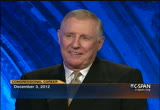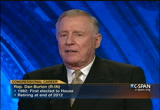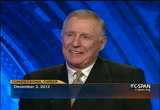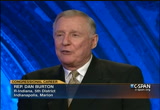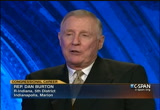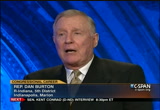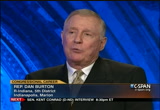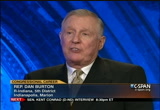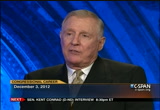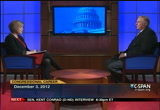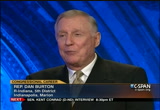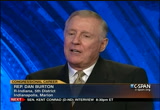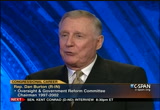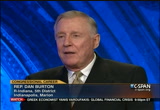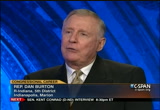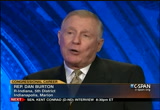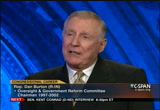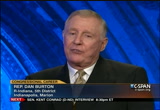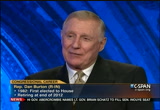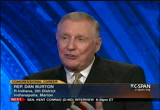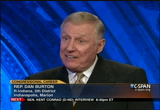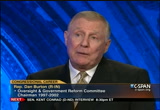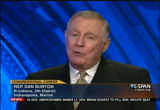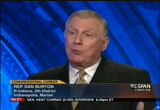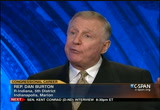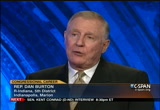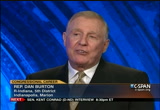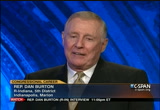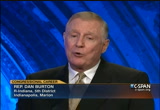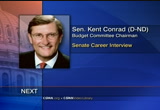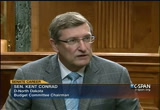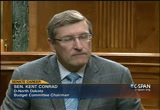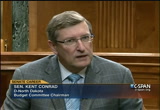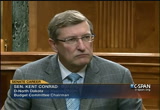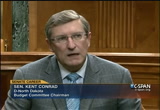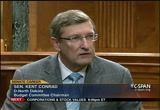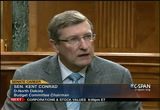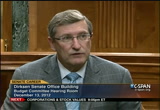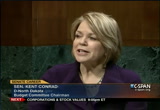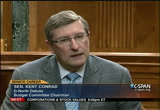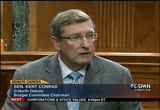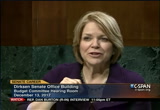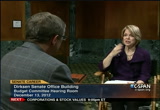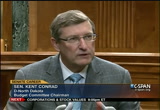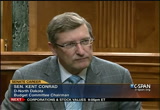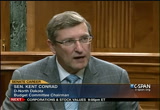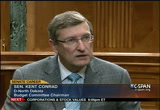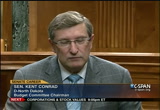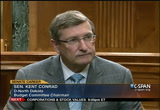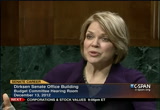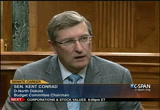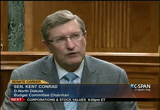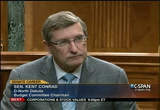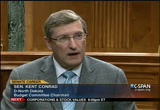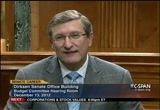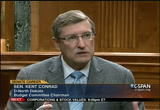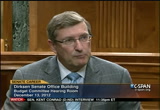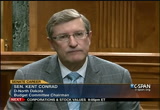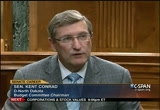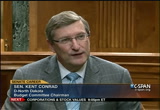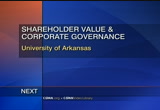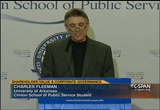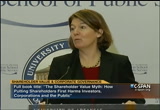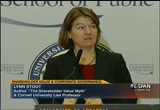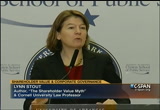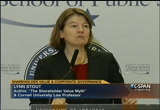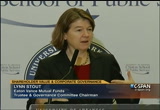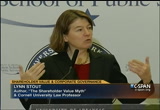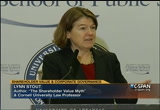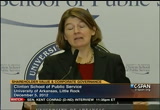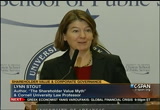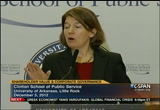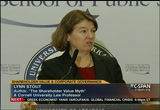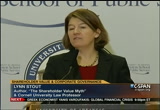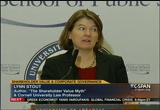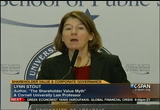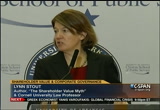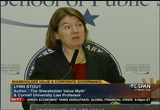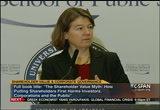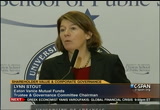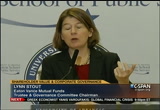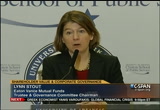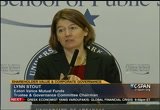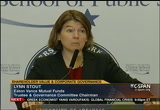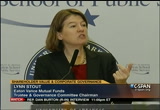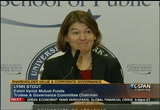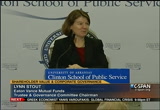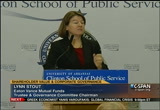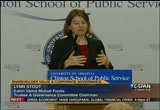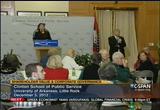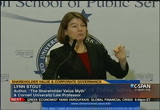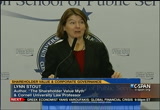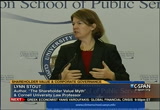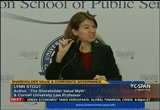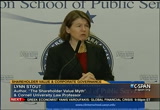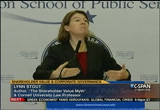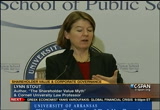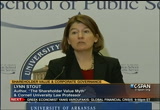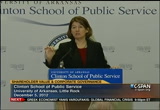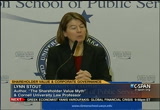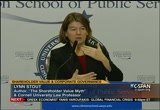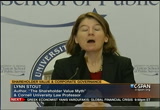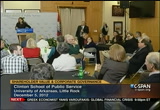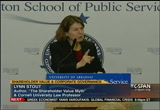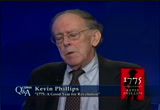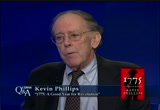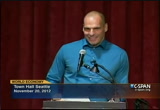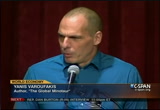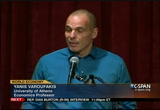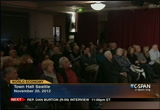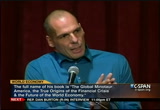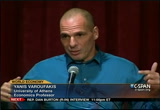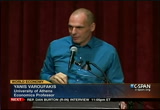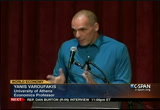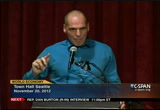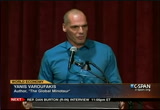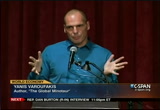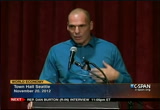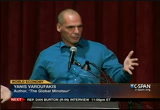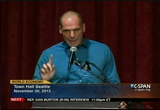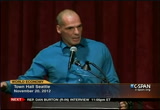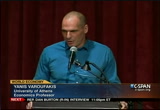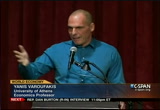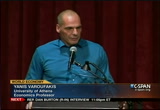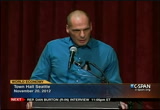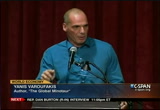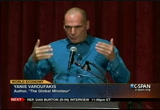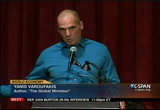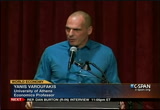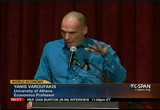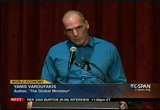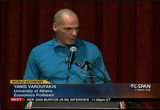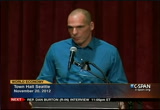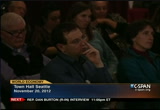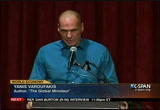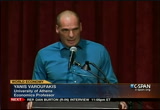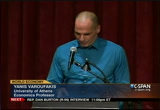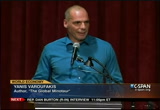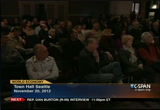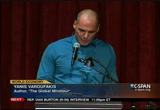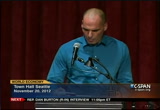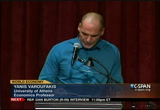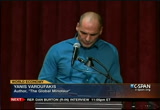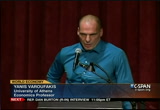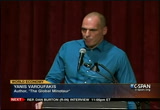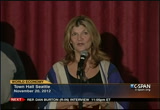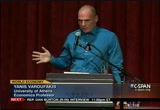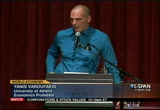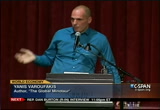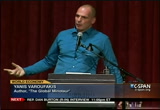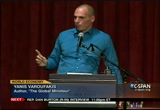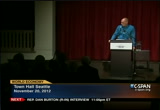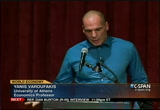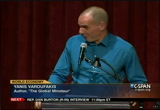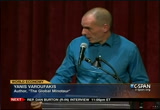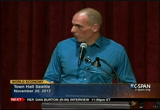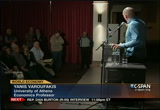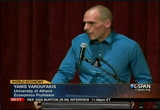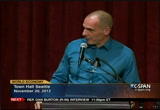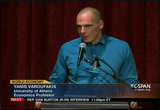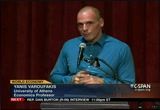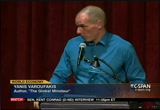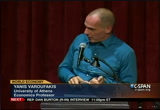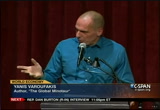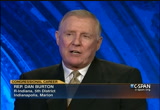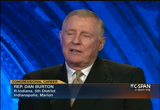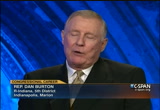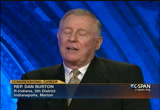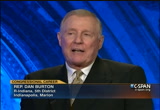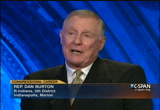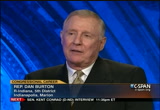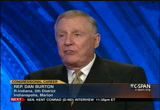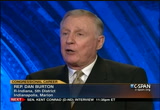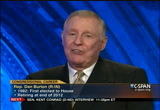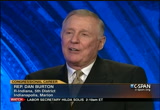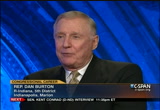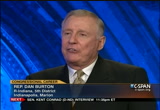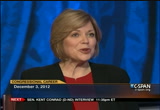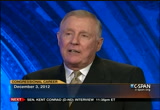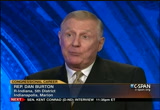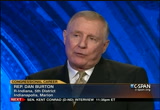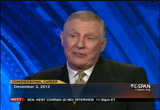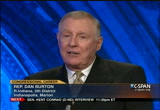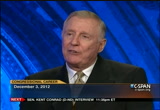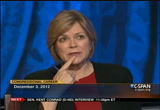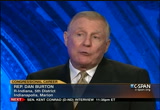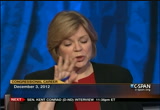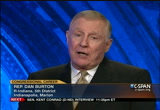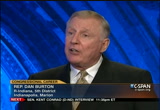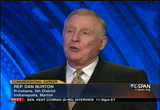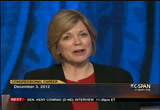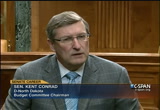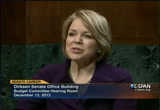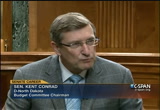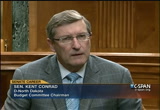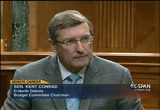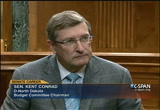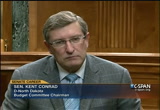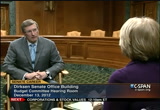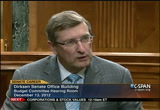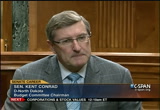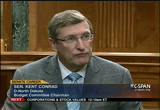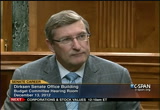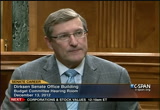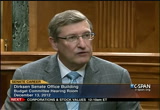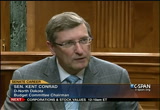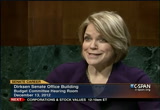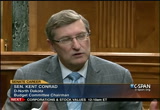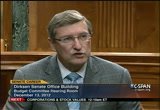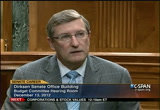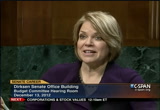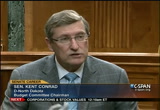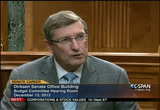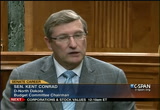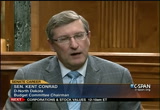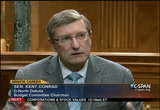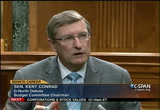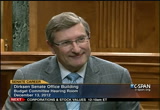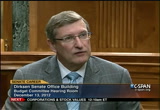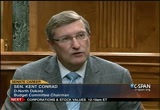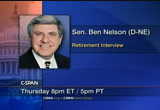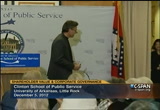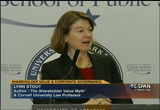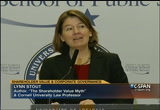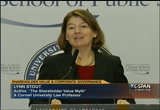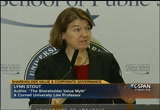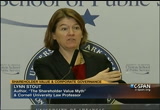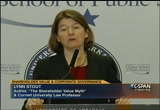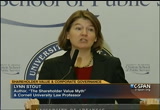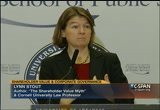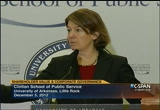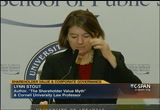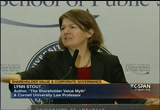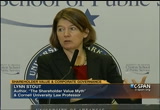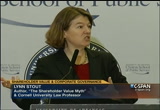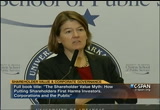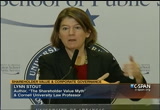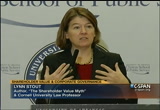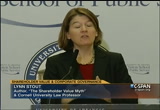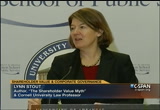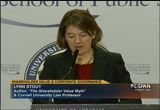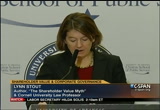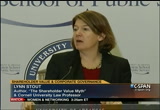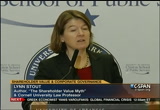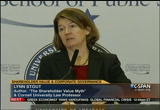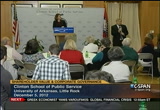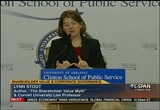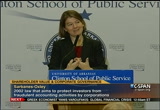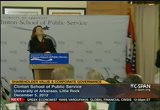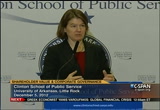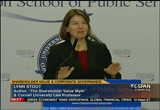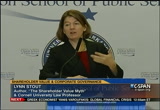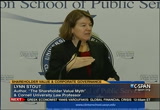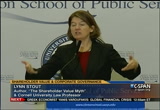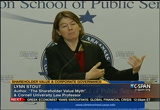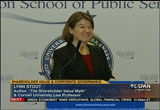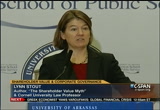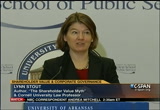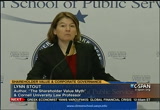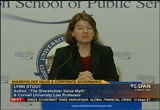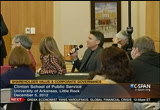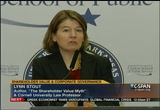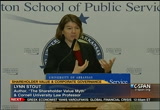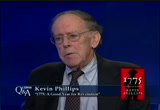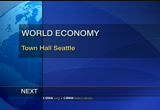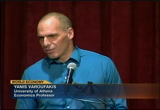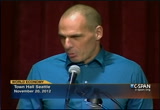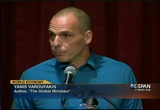tv Capitol Hill Hearings CSPAN December 26, 2012 8:00pm-1:00am EST
8:00 pm
8:01 pm
on his 26-year career. and a discussion on corporations and stock values. dan burton is retiring from the house this year after 30 years in office. the 15-term congressman represents the fifth district in east central indiana which includes parts of indianapolis and the surrounding suburbs. earlier he talked with c-span about his past investigations of the collective demonstration and the oversight ruled congress. this is 30 minutes. as you exit the institution how would you say it stated? >> it has changed a great deal. it is not the same as when i came 1983.
8:02 pm
there seemed to be more comedy. tip o'neill was speaker. i will never forget he was the first time he was on the floor raising cane with democrats. he had someone take his place and he came down and started giving me the dickens. after that we became very good friends and played golf together. michael was a wonderful leader. there was a spirit of camaraderie even though we had differences politically then that we do not have now. now it is much more combative. i have a lot of friends on the democratic side of the aisle, very good friends. as far as working things out is not as easy as it used to be. >> what are some of the root causes? >> i think and i am not pointing fingers, when we went after jimi
8:03 pm
was the newt speaker and jim was forced out of office. they went after newt. that is one of the things that started this movement. over time, i think it has become political as well as personal. much more political and personal. >> she said raising cain, are -- you will the the gavel for the oversight committee and use that to raise the number of investigations especially of the clinton administration. what do you see as your legacy of that tenure? >> i think bill clinton, president clinton and secretary as secretary -- hilary as secretary of state do not like me very much. i was chair of the government
8:04 pm
oversight committee during the time we were investigating whitewater and we were investigating campaign contributions that came from sources outside the united states and from various people. there was an awful lot to that. we had people testifying like ohnny chonung, they had contributed money to gain favor with the white house. and they came into the kitchen at hong kong and said we wonder -- we like your president and we want to contribute to his campaign. the man who said that was the equivalent of the cia. these were people who were under oath and swore to this and we
8:05 pm
also had over 100 people take the fifth amendment or flee the country. there was a lot there. that is not to say that president clinton did not do some good things. he worked with newt gingrich and we got out from under some difficult financial problems but i do believe and i still believe there was some illegal activities that took place and we were unable to get the job done. i've always said that janet reno was the greatest blocker than anybody i had ever seen in the national football league. one thing i've learned was if you're the president and you want to protect your legacy and office you want to make sure you have an attorney general that will protect your back and janet reno, god bless her, she did that very effectively. i sent five criminals i thought were ironclad and she never moved on any of them.
8:06 pm
the clinton administration did a lot of good things. i also think there were things that were done wrong. that should have been pursued and that is why we pursued them so diligently. i was criticized roundly, they made fun of a lot of things we did. that goes with the territory. >> when you want to explain to people about the investigation's power of congress, how do you explain that role of congress? >> the congress has the responsibility to ferret waste, and abuse. we're supposed to oversee that. most committees do not do a good job of it. when i became chairman, newt charge me with being aggressive in a number of investigations. i investigated the food and drug
8:07 pm
in restoration and the fbi and the white house and we found there were people in jail for crimes they did not commit. j. edgar hoover knew about it. there were a lot of things that were wrong in government that were not readily known. we had our investigations and we were very aggressive. what did we do? i issued over 1200 subpoenas. i do not think anyone will ever touch that record. i am not sure it is a good record but it was when i thought was necessary. we wanted to get to the bottom of a lot of these things and i think it paid off. we not only put pressure on the clinton demonstration, i put pressure on the chief counsel at the white house. i know you probably heard of whitey bolger who was captured recently. his brother was one of the
8:08 pm
people we have before committee working on that. there were a lot of things we did. that is the responsibility of congress. the oversight of the executive branch and the agency's of government is extremely important. no matter what you believed, what you think, there is free to be ways -- waste or fraud and criminal activity and abuse in any government. and you have to take a hard look at it. >> with that hyper-partisanship you were talking about and it's true causes, did your aggressive stance for investigation contribute to that and if so, is that the price you think is necessary to pay? >> i think that it did contribute that. you are stepping on toes. when you go after the president of the united states, he had better have doorplate -- amor armor plate.
8:09 pm
they will put a stop to your investigation. they contacted girls i dated in school, they went into everything. that is one of the things you have to expect when you are aggressive and it does cause problems. i have no regrets about it. if you're going to do your job and do it to the best of your ability and live up to your commitments to the constitution, you have to be ready to take the slings and arrows of outrageous fortune. >> what did you learn through the experience of the powers of the executive and the powers of congress? >> as i said before, i learned the president of the united states, if he has an attorney general that will stand behind him, there is very little that can be accomplished as far as bringing illegal activity to the fore and to justice. richard nixon, he went to
8:10 pm
his attorney general and did not get support. i do not think he would have left office. i felt we had strong evidence of illegal activities. janet reno protected him and i think that ended up helping him a lot. but i want to point out if bill or hillary is the attention, they did some good things and i think the economy of the country was helped because he worked with newt gingrich so there were some positives but nevertheless, i feel like there were some things wrong that we were pursuing. >> we're talking about president to served -- you served under five of them. i wonder if you could reflect on which of those presidents and administrations to the best job of relationship-building with congress. >> no question, the greatest man i ever met and the credit -- the
8:11 pm
greatest president was ronald reagan. ronald reagan had a heart and determination and i have -- that i have not seen anybody in the white house or anyone in congress since. he was a soft-spoken fellow who was so underrated, it was not funny. let me tell you a story about his heart. my father tried to kill my mother when i was a boy. that is one of the reasons i never liked bullies and why was aggressive on a lot things i did. i think my father had a lot to do with it. he went to prison and my mother waited on tables for 18 years and he went -- she married a man who went to the grade. i said i will take you in the front door of the white house and sintroduce you to the president. they looked at each other and said yes. 18 years later i got elected to congress and i called reagan's
8:12 pm
secretary and let me see if i can arrange this. they range did and -- arranged it and mom and kenny came. we went into the oval office and president reagan came over and said, i want to tell you your son is one of the brightest young congressman we have and he is going to do great things. i know you have to wait on tables for 18 years and it worked in a foundry. and danny had to shine shoes. we had those problems in my family. isn't it great we live in a country where you can achieve anything? he had had his secretary called my abbas to find out about me and my family. when i walked data that office, i would have done -- out of that office, i would have done
8:13 pm
anything for that man. she was so happy and she carried the picture until she died. her favorite actor was ronald reagan. >> a lesson for that about relationships for president is the personal touch? >> it is a big part of it but it was not just a personal touch. he had goals like the strategic defense initiative. i was the first one who defended him against a guy named al gore and tom downey. i went after them for about an hour. reagan wrote me a nice personal letter the next day. he was very committed to what he wanted -- mr. gorbachev, tear down this wall. once he made up his mind he was very strong in his position but he was also very amenable to dealing with people where he could. he was not so hard knows that he was not willing to try to find a way to solve problems. he worked with tip o'neill, a
8:14 pm
very strong democrat, in order to solve the social security problem and i am not sure any other president would be able to achieve what he did. plus the economic growth with his tax cuts. i think he had that real nice, soft personality, a very warm guy who knew what it was to be poor and to fight your way out of difficult things. but he was also a man who had convictions. he was willing to go to the mat if he had to. a good man. the best i knew. >> does the presidential nominating process bring candidate in to this system with conviction, with the kind of skills you think it takes to be a successful president? >> i do not mean to disparage anybody who has run for office but i think there is too many people running for office who are concerned about politics in getting elected than doing what is really right. i feel like ronald reagan was one of those guys who had a
8:15 pm
commitment in his soul to do what he thought was best for the country, and not to worry about being partisan all the time and being worried about the next election. and so i think right now we have too many people that when they run for office they read the polls and they try to do what they think is going to get elected instead of saying what they believe and i think it is time now that we need people who will speak out forcefully about what they believe, because the people of america are hungry for that. they want someone who will say clearly, this is what i believe even if they disagree but i will do my best to achieve these things and stick to it. i think people -- i have people in my campaigns say i do not agree with you on this but i think you're a straight shooter and i will vote for you anyhow. i'm not holding myself up as any paragons of virtue but i sense from that that people are willing to give you a chance if they think you are a straight
8:16 pm
shooter. >> you made reference to using for time as a way to achieve policy discussions. when you looked back, you have spent a lot of time on the floor. some members never go to the floor. how have you seen the floor as a research as a member of congress? >> they used to be that you could get down and -- go down and get an hour's special order. a guy from texas would talk about the space program and talk about chuck holes in his district. they started changing it that we had quit by midnight. i think we have gone too far. members need to speak their mind on personal time more than just five minutes in the morning and maybe one minute at night. many times, there are things that need to be eliminated with
8:17 pm
a little extra time and getting two minutes during a debate or one minute at the end of the day or five minutes in the morning, sometimes as i get it done. i would like to see the revisited. >> many members complained or hearken back to the time when members used to stay around on the weekends and go out to dinner with one another and families would get together. what changed that? >> i think the acrimony that started with the jim wright case and going after newt, that was a payback. i think those were the seeds for a lot of that. we're not friends any more. i still get together with some people for dinner. very rarely is it with my democratic colleagues. there are some democrats are really like, charlie rangel. there is a lot of guys that i like on the other side of the aisle and we get together once in awhile but it is not like it
8:18 pm
used to be. it should be better. >> any sense of congressional scheduling practices change that? >> when i first ran, i spent 200 tricky thousand dollars or thereabouts my first campaign -- $250,000 or thereabouts for my first campaign. members spend an inordinate amount of time at their headquarters calling people, begging for money. i think you spend maybe one- third to one-half of your time asking people for money. that should not be the main objective of our job. we should be doing the job for the people instead of worrying about raising money. i do not know what the answer is. maybe limiting the terms of the campaign, i do not know what it is. you cannot limit the funding because of the first amendment. it is gone way beyond the pale.
8:19 pm
i think -- we have state representatives that are spending three-quarters of a million dollars for house in indiana. we have gone beyond where we should. >> in addition to your long service, you have been on foreign affairs. >> 30 years. >> a somewhat early association was with jesse helms. how did that alliance come together? let's start with that part of the story. >> i was always a strong anti- communists. i never liked fidel castro. i became chairman of the subcommittee on western hemisphere. i worked with some of my cuban- ileanaan friends, ke ros-lehtinen and bob menendez and we worked hard to put sanctions on castro to try to bring that regime down.
8:20 pm
it was not until the soviet mig that was shot down, they shot a couple of them down. one of them made it back. that created a huge for error -- furor. bill clinton was put in a difficult position. i was the author in the house and the jesse helms was the author in the senate and we worked together on the bill along with my cuban-american brands. >> that regime is still around. at the time, a number of our allies protested the bill. in the rearview mirror, how effective was it overall? do you feel good about that? >> it shows the repression is so strong in cuba, the ability of
8:21 pm
fidel castro to reach out to some of his "friends" around the world that he has been able to circumvent sanctions. i think we ought to do everything we can to bring freedom to the people of cuba. the helms-burton law was not as effective as i would have liked. >> another issue out you are associated with is autism. how did that get started? >> my grandson was a very normal child. when he was 18 months to two years old, he got nine shots in one day. seven of which had thimerosol, mercury. it is a preservative. in 1929 it was tested on the 29 people who had meningitis. they said that the mercury had no impact so they started using solutions.halmologic
8:22 pm
when children get a few vaccinations, it did not have a huge impact but they started to get as many as 25 or 30 before they get to the first grade. my grandson got nine in one day and he became artistic, banging his head against the wall. then diary and constipation -- diarrhea and constipation. he was doing terrible. i was not aware of autism and all but i was chairman of the committee that did the investigation so i started to looking into with health and human services and the food and drug administration and that is where i had four years of hearings on that and i became convinced that women -- that mercury, women who are pregnant should not eat any fish. we are injecting it into our children and adults in the form of vaccinations and the brain tissue according to the scientists we have before the committee is very soft and it is
8:23 pm
hard to get that mercury and of their once a gets into the brain. we also had -- mercury out of their once it gets into the brain. and we saw very clearly how it affects the brain cells. i would be working on this after i get out of congress to get mercury out of everything that goes into the human body. a causes autism and other neurological problems and is a contributing factor to alzheimer's. when you get a flu shot, and has mercury in it. and so i have to tell you right now. my colleagues do not know it. we used to have one eye and 10,000 children who were autistic. we're looking at it -- one in 10,000 children who are autistic. we have an epidemic and we have to find other reasons. the mercury in vaccinations is a contributing factor. >> after the
8:24 pm
investigation, did anything else, of that effort? has anything changed? after the investigations, did anything else come out of that effort? >> we were able to change the vaccinations. they have also tried to sneak legislation to that will protect the pharmaceutical companies against class-action lawsuits and we have been a will to stop that. it is a never-ending case of constant vigilance to make sure they do not protect themselves. i met with the leaders of the various pharmaceutical companies, ceo's, a whole bunch of them. i said if you would put money into the vaccine injury compensation fund to compensate people who were damaged and did you get mercury out of the vaccinations and put the shots into single-shot vials which
8:25 pm
cannot require a preservative, i will get legislation passed that protect you against class-action lawsuits. it would not do anything with it. i will continue to fight and one day, 10 or 15 years from now, somebody will say to you remember dan burton? we finally got mercury out of those things. mercury is toxic to the human neurological system. we need to get every form of mercury out and in particular, stop the vaccinations. >> we have mercury in the light bulbs. >> if you drop one and breaking, there're all kinds of things you have to do to protect yourself from being exposed to the mercury. we have l.e.d. bulbs and they work fine.
8:26 pm
where we using this things? >> back to autism. you have the great support of the autism community. is the aspect is of it size of the debt. you have brought lots of federal dollars to autism. including money going back into your district or there is a center at the university. >> they wanted me to name it after my grandson. >> were that way, your personal interests as a member of congress and an important issue with where we are today on the size of the federal debt. how should people think about those things? >> we should prioritize our spending. we spend an inordinate amount of money on the aids epidemic which i have no problem with. we need to find out how to stop it. we're spending a huge amount of money on that and not a great deal comparatively on autism.
8:27 pm
or other neurological diseases. we have -- we are spending more than when i first started this crusade but we certainly need to spend more. when you see the huge increase in the number of people dying from alzheimer's and you realize they're putting mercury into human beings and that is a contributing factor into these problems, we need to spend more money finding out how to stop that. we're not spending nearly enough. we spent $40 million year, maybe 50 or 60. nih gets billions of dollars. this is an epidemic that must be dealt with. if you have an autistic child, that child will probably live to be 70. you may not be able to take care that charles past 18 or 20. we have people who are afraid to be in the room with their child because they are afraid. people are losing their homes, they are mortgaging their homes to help their kids and it does not work. this is to be a huge burden on
8:28 pm
their families and the taxpayers over the next year. we need to get to the bottom of it as quickly as possible. all these things are important. my first wife died of cancer. aids is important. autism is an epidemic. it will stick with us for the next 50 years. we have to deal with it. >> we have four minutes left. with regard to the state of the u.s. economy, you have some important votes cast before the lame-duck session is over. what is your level of confidence about the future of the u.s. economy right now? >> i am not really optimistic. we have a short-term solution. the president wants to spend more money. i understand that. he also wants to raise taxes on people over to rudder jetty thousand dollars and he will get part of that -- $250,000 and he will get part of that. he will have a bill that says we have to give everyone a tax cut,
8:29 pm
who will vote against that? he has the ability to wait. we are trillions of dollars in the hole. not just $16 trillion but 6070 -- $60 trillion or $70 trillion. we will have a severe economic problem. i hope i am wrong. i hope there is a solution. unless something radical changes, we will see a severe economic problems and high inflation. >> you made the decision not to run again. what will you miss most about congress? >> i will miss the camaraderie. i was one of the founders of the republican study committee which started with four of us. now there is over 170 members. i was talking to them the other night, they were honoring me as one of the founders and i said when i was 19 and in the army, i was lying on my bunk and looking around the room at the guys that
8:30 pm
had -- i had gone through hell with in basic training. i will miss everybody. i will miss a lot of them, all of them. >> what will you not mess? >> i will not miss the feeling as -- that you are not accomplishing as much as you should. i wish my colleagues, i wish you the best. keep fighting. i will be rooting for all of you. >> what would you like your legacy to be of this 30 years? what would you like to be remembered for? >> i would like people to think he might have been a bulldog but he was a man who believed in honesty and integrity and the things that were right for this country and regardless of how difficult it was, he kept to those principles. i hope they will get me like that. a lot of people think i am a bad guy and did a lot of goofy things but i hope they will think i am a man of integrity.
8:31 pm
>> what you plan to do next? >> i am not planning on lobbying. i would like to represent some international companies. i have been chairman or ranking republican on all the subcommittees' and i can help some international companies and some countries. >> do you plan to stay in washington? >> it depends on what kind of business i can acquire. i have a beautiful wife and i want to spend more time with him and get my golf handicap down to single digits. >> have you thought about the preservation of your papers? what will you do with all that? >> i am sending most of it to indiana university. especially the autism information. i have -- the indiana historical society will get some of my papers. i hope they find a good use for them. >> when you look back over 31
8:32 pm
years which went by very quickly, what were the best years? >> oh, gosh, there was good in all of them. the best years from my standpoint was when i was chairman. even the people who work for me said, we felt like we were accomplishing something. we were fighting the good fight. that is one of the things i hold most dear. we were able to put on the gloves, grabbed the sword, and fight for the things we thought was right. >> thank you for spending time with this reflecting back on your ears in washington. -- years in washington. >> we are asking business owners to come in and talk about the fiscal cliff and their plans for the next year. we will continue with the forecast for the housing market with the chief economist with
8:33 pm
the national association of realtors. fall by more discussion of the fiscal cliff negotiations -- followed by more discussion of the fiscal cliff negotiations. and a discussion on background checks. how they work, who gets them, and when they are required. our guest is matt bennett with the third wayl . on "washington journal" at 7:00 a.m. >> kent conrad is retiring. the north dakota democrat talk about partisanship in the senate and his time working on economic issues including his service on the bulls simpson commission. -- bowles-simpson commission. this is 30 years. fulle're talking in a week o
8:34 pm
of farewell speeches. what is that like? >> it has been great. i have that going away party the night before. a lot of my colleagues were there. then the farewell speech in which i had a chance to reflect on my service here but also to challenge my colleagues to finish the job on the grand bargain to get our fiscal house in order and i laid out the specifics on what would be a genuine compromise between the two sides. it was satisfying. >> why did you decide not to run again? >> many reasons. i have served here 26 years. less than 5% of senators have served that long. part of it is i am tired of living out of a suitcase. imus 80% of our anniversaries and 85% of my wife's birthday
8:35 pm
is. it is time for somebody else to take this on. sometimes change is a good thing. after 26 years i felt the need to have somebody else take these responsibilities on. >> some people have written the senate was not the same for you after howard barden decided not to seek re-election. >> that is true. he is my best friend. we have been together in political offices, government responsibility for a long time. and more than three years. when he decided not to run again and my other colleague was defeated, it was less rewarding for me personally to be here. less enjoyable for me to be here. i am sure that plater role. quex in your speech in your
8:36 pm
description of the senate, do think the public shows that few of your -- your view of that institution? >> pro will not. it is the world's greatest deliberative body. we are efficient at it producing results. what i also said yesterday was there are problems here and the problems i believe are clear is that we spend too much time trying to seek political vantage. partisan political advantage. too little time focused on solving the country's problems. i am sure that had a role in my decision as well. i came here wanting to do big things and went to work on solving problems. there has been much less emphasis on that lately. much more of an emphasis on how you get over on the other guy.
8:37 pm
i understand this is a team sport and i understand this is competitive but at the end of the day, if we're not solving problems, it is pretty empty. >> during your 26 years, can you trace the judiciary of the partisanship and explain what its roots have been? >> i can see it very directly going back to 1994. newt gingrich had a view to take over the house of representatives when he wanted to bring down the institution and things have never been the same since. that is not to say that there were not very deep faults on the democratic side because their work. there was an arrogance of power that had developed. in part the republicans reacted
8:38 pm
to that. it has set off a chain of events and a dynamic that is very unhealthy. i hope very soon that we get back to working together, understanding there is a competition. and solving problems. that is with the country needs. >> how much a role as the money and politics played in partisanship? >> huge, especially the citizens united case which allows unlimited corporate and wealthy individual contributions. you do not have to identify the source in many cases. that is a cancer on our democracy because what that means as individual members have to spend even more time fund- raising, even more time being entirely political in order to survive. that is extremely -- an
8:39 pm
extremely in healthy development. >> what about the public themselves? the country has become over the last quarter century less aligned with parties and also that pushes the party's more to the extreme. many boats are 50-50. how has public sentiment changed this institution? >> this institution and the house of representatives is a bright reflection of the american people. because they choose who represents them here. and they are deeply divided. beyond that, you have the effect of media. 24-hour news which they have got all that time to fill and so frankly they look for the loudest voices to put on the air. people who say the most outrageous things are the one who get their time. that has played a very central role in how this has all evolved.
8:40 pm
we have to make some traces as a country. are we going to reward the extremes? or are we going to look to the sensible center as the place where decisions need to be made? >> how do you see -- in some cases it is as it is. the supreme court has ruled on campaign finance and social media is here to stay. what do you see as a possibility for healing of the institution? how can that happen? >> mine unbelief is actions are needed. decisions need to be made. that requires leadership. that requires people to step forward and say, follow me. i am going to take us in a different direction and we're right to face up to these things. is each individual. the choice -- it is each
8:41 pm
individual's choice. >> you have written books about the great leaders suggesting they are few and far between. do you agree with that? >> i think there are many exceptional people here. i said yesterday in my farewell speech i have enormous respect for this institution. the vast majority of my colleagues want to do the right thing. many times doing the right thing, it is hard to know which is the right path to take in the midst of all this quality -- midst of all this quality. >> that is different from leadership. >> we need very much is leadership at every level. that means from individual members as well. they have got to decide, are
8:42 pm
they going to be part of the herd or will they stand up and say what they truly believe? are they going to be part of solving problems. -- are they going to be part of solving problems? that is what it needs to be about. >> where does the optimism come from? do you see some signs hear? >> i see signs in the membership. talking to my colleagues, they want a different direction. they want to be part of something that is producing results for the american people. i find republicans and democrats really are like-minded in the sense they want to produce results. >> we're talking in a room you spend a lot of time in. you came to the senate from the state and your public career has been around finances at the
8:43 pm
state and federal level. what do you see as legacy -- the legacy? >> the thing i'm proudest of is what we were able to do in the clinton years when we were able to actually balance the budget. creative the longest -- created the longest period of growth, ion jobs andillo paid down the debt. the -- we came forward with our proposal that became the bowles-simpson commission.
8:44 pm
i still believe that is the best blueprint for going forward. i was also part of the group of six that became the group of eight. it laid out a framework last year. many of those ideas were captured in the proposal i made yesterday, a detailed proposal for how you could compromise these difficult issues in a fair way and get a result. >> let me start with the 1990's. how much of that success was the bursting economy and the paetec bubble that was happening that brought more money into the coffers? >> all of these things are connected. that is my belief. what happens in the private- sector trade will -- private sector. that gave additional confidence
8:45 pm
to the private sector. people knew what the rules of the road were going to be for an extended period of time. that helped unleash corporate investment. the same thing could happen today. that $1.70 trillion sitting on the balance sheets of american companies. i have had corporate leaders tommy parker the reason they're not unleashing that money -- tell me the reason they're not unlacing that money is they know makingecisions where are here. >> there are gangs of this and groups of that that happened formed in the past five or six years. how much of that is an indicator of the institution not functioning? >> when you have had major problems, these groups tend to
8:46 pm
form and there's a long history of that here. going back to andrews air force base and the budget that was entered their. you see when a complex financial -- when there are complex financial matters, these groups form. people have to get their homework done and get an understanding of how these complex questions can be resolved. i do not think that is so much a reflection of this -- of this function as it is a historic precedent of how things get done. >> when you look back historically at these bipartisan commissions or other groups, you mentioned the energy airforce base. during the reagan administration, a great big commission that sounfound a soln for social security, these were big public fora where
8:47 pm
discussions were held with the public and now everything seems to be happening behind closed doors. why could openness happened in years past and today we can seem to get to deal? >> in large measure because the media has so changed. in those days, you did not have 24-hour coverage. what you find with 24-hour coverage if an idea services, at 10:00 a.m., it is dead by 2:00 p.m. because everybody goes to the cameras. the cameras are there. ever-present and wine to -- wanting to hype something. before you debate it is dead. you really see that around here.
8:48 pm
>> there has been a fair bit of criticism of the president for not embracing the findings of that commission. what is your take? >> i advised the president not to embrace the specifics because i feared if he did, house republicans would automatically be in opposition. if you are part of the commission you saw that dynamic. there were 18 of us. six representing the president, six representing the senate, six representing the house. five of the six representatives of the present voted for the recommendations. five of the six representatives voted for the recommendations. five of the six representing the house voted against them. r's.d's and it kind of tells the story. >> what does it tell? >> the house is voted on -- far
8:49 pm
more reluctant to make them popular kinds of decisions than the white house or the u.s. senate. >> does that suggest there should be a constitutional change? does the institutions to work for society the way the founders intended? >> i believe it would be good to extend terms to four years. that would give them a greater ability to do things that are not immediately popular and we are borrowing 31 cents of every dollar we spend. to get this back on track, require some decisions that are not popular by definition. if you are cutting programs and raising revenue, you are upsetting people. you are doing things that are not popular. it is tough in political life to go back to your constituency and say, what i will be doing now is i'm going to cut some spending on a program that is popular with you and at the same
8:50 pm
time, i am going to be raising revenue, which means raising somebody's taxes that help close this gap. we were burrowing 40 cents of every dollar we spent. we have made some improvement down to 31 cents being borrowed of every dollar we spend. we have a long way to go and we know that the trend line is not our friend. because of the demographics, the baby boom generation, the revenue base is inadequate to meeting what has been the social compact -- contract to have social security, to have health care provided to at least our seniors, now more broadly to a guarantee that everyone would have health care coverage. this is a challenging time for those who seek to represent their states and their
8:51 pm
districts. >> listening to one of the many press conferences happening in this town during this deadline, a reporter described where we are right now as a situation of washington's own making. the circumstances, structure, and deadline were part of that earlier negotiations. how did we get where we are today? >> on the revenue side to go back to the bush years when they passed the bush tax cuts for various procedural reasons. it wanted to shoehorn as much tax cutting as they could into a 10-year period and because of the rules, they went overboard, did much more in a way of tax cutting then we can afford. it was apparent at the time they did it. to make it work they sunsetted it all. that is why the bush tax cuts
8:52 pm
are about to expire. the same is true of the so- called the sequester. it is an across-the-board cut of $1.20 trillion focused on domestic spending, it was put in place to provide leverage to the special committee that was supposed to resolve these matters and it was supposed to be the sword of damocles that if they did not reach an agreement to sequester would drop and there would be an across-the- board cut. no distinctions, no prioritization. just cut across the board. and guess what? the special committee could not reach an agreement on an overall fiscal plan. so this sword of damocles is about to drop and put into place a policy no one thought was a good one. >> what is congress' role in this? >> i opposed it.
8:53 pm
i said this was going to lead to trouble. i laid out where i thought it would ultimately lead us and career. -- leave us, and he we are. -- here we are. alan greenspan said in a book he wished he had listened. the package does not work, does not add up. wars.goutfought two >> not paid for. one of them will prove to be the longest in american history.
8:54 pm
completely paid for. we were cutting taxes during that time, so she must. we made a decision -- during that time, shame on us. we made a decision. iraq had nothing to do with the attack on the united states on 9/11. there was an amazing amount of confusion in the country. people believed that iraq was somehow behind 9/11. it was not iraq. it was al qaeda. al qaeda operating out of afghanistan. as evil as saddam hussein was, operating out of iraq. another very serious misjudgment we're paying for in spades. >> we have 10 minutes left. it have also been a big champion of energy policy. during the past decade.
8:55 pm
you have to change the economy. your concern has been energy. where will the discovery of energy lead us? >> it is incredibly positive for the united states. already we have gone from going 16 -- 60% dependent down 42%. substantial progress has been made. there are a lot of projections that we could become energy independent over the next several decades. that would be an incredible boon to this country. instead of sending $400 billion or $500 billion to buy scarce energy supplies from people who do not like this, we could be spending that money here at home. think of the difference that will make to the economic strength of the united states. what it will mean to job opportunities, what it will mean to the economic strength of
8:56 pm
america. and natural gas is a very clean research compared to many of the other options. our progress in reducing our dependence has not just an oil and gas. it has been renewables. 10% of the electricity in my state is provided by wind power. you see these giant wind generating machines. a total transformation of the energy supply of my state and much of the country. on top of that, increased fuel efficiency in cars. reducing our demand for fossil fuels. these are extremely positive developments. >> what does it mean for your home state? >> a vibrant economy. the highest budget surplus per- capita of any state in the nation. extraordinary economic
8:57 pm
opportunity. >> that would be a change for the cultural economy. you have been a big champion of the agricultural industry and have been proud of the for money in that brought back to the state. i am interested in having you square your pride in bringing resources to north dakota. >> very easy to do. the farm bill we just passed reduces the deficit $23 billion. the last farm bill that we passed that was completely paid for at my insistence as budget committee chairman. if everyone else were functioning the way the agricultural sector has would not have the budget problem. we faced up to reality. we had more pay fors than expenses. in this bill even far more in
8:58 pm
the way of deficit reduction. it demonstrates this is possible to do. but you got to have leadership and you got to have people who are willing to make some tough decisions to get it done. >> we have about five minutes and i want to talk more personal. you have decided to leave your papers of your quarter century plus to george washington university. why is that? >> i went to george washington university. they have tremendous resources there to take advantage of this collection which is loaded with history. >> what kind of things will researchers and historians find? >> i will find a single-minded focus on fiscal responsibility for 26 years. my staff says the remarkable thing i am looking at this collection is how consistent i have been about.
8:59 pm
attention to fiscal responsibility and making -- about paying attention to fiscal responsibility and making sure things add up. i make a list every day of what i want to get accomplished that day. almost every day at the top of the list is deficit. get the deficit under control. until we did it in the 1990's. and why did i have a single- minded focus? i've always understood the most important responsibility of government is the economic security of people. if you do not have your fiscal affairs in order, we learned in the economic downturns in my state that debt can work for you. it can also crush you. i have seen people crashed by -- crushed by debt.
9:00 pm
my family lived through the great depression in the 1930's and it exacted a terrible toll on the people of my state. i have always been focused on economic growth, economic opportunity, and irresponsible with the resources at hand. -- >> the c.s. becoming like greece? >> no, that is a profoundly -- do you see as becoming like greece? >> that is a profoundly different situation. the congressional budget office says that if we stay on the course we are on, we will have a debt that is 230% of our gross domestic product of the the next 20 years. most experts say once you get a
9:01 pm
debt of more than 9% of gross domestic product, that inhibit future economic growth in a significant way. this is just about -- not just about numbers on page, it is really about opportunities for people. whether you will be able to send your kid to school, to college, whether it will be able to buy a car, my house, whether we will have economic opportunity for the people of the country. the best academic research that has been done shows that if a country's debt gets too large in relationship to the size of its economy, the economy does not grow as fast. opportunity is lost. jobs are lost. so there is a similarity with what is happening in europe and what could happen here if we don't get our house in order. >> you talked about a single- minded focus, yet you are
9:02 pm
leaving with jobs undone. how do you feel about leaving at this particular point in time? >> we still have several weeks. we have laid out the plans and all these efforts i have been part of and other efforts as well. i still have some optimism that we will get this job done. one of the reasons i did not run again is the really wanted to focus these last two years. i knew if i was running, i would not be able to be in the hundreds of hours of negotiations i have been in. i believe many of the ideas we have generated will be part of any solution, whether it comes before the end of this year or early next year. i believe the work product we have produced will be part of the solution. >> you talked about no longer missing a 80% of family birthdays.
9:03 pm
what will you be doing then? >> i will be doing some speaking and doing some teaching. i have people starting to talk to me about other opportunities. i can assure you one thing i will not do is lobby. i have made it clear to people who have contacted me, that is not my interest. that is not what i am going to be doing. >> will you stay in washington and hope to influence the process? >> my wife represents major league baseball. she is also chairman of the sports coalition so i am sure we will spend a paramount of time -- i am from north dakota, through and through, so we will be going back and forth a lot. i have not made any commitments except a speaking tour i have committed to doing.
9:04 pm
beyond that, i really don't know. maybe journalism. >> after what he said, i doubt that. do you have any sense of when you first turn on the television set and watch the senate in action, you are not part of that body? what is your reaction? >> relief. [laughter] a sense of relief. i am sure in many ways i will miss the opportunity to participate, but i have done this 26 years, and i am really ready to do something new. i look forward to being a respectful observer of what goes on here, knowing how difficult it is to get a result and do your best. >> thank you for spending time with us. >> i enjoyed it. >> on thursday, more interviews with retiring members of congress. at 8:00 p.m. easter, senator ben nelson of nebraska talks about his two terms and his time as a
9:05 pm
member of the gang of six. then at 8:40, represented jerry lewis of california on his 17 terms in congress. that is followed at 9:15 with representative lynn woolsey on her anti-war work. that is thursday at 8:00 p.m. eastern, here on c-span. >> tonight, a discussion on corporations in pursuit of high stock values. then a group economist explains why he believes the u.s. is responsible for the global financial crisis. later, interviews with retiring members of congress. on tomorrow morning's washington journal, we are asking business owners to call in and talk about the fiscal cliff and their plans for next year. then we will continue with the forecast for the coming years
9:06 pm
housing market. that is all about more discussion of the fiscal cliff negotiations as congress returns to washington. we will be joined by steve forbes. later, discussion on background checks, how they work, who gets them, and when they are required. our guest is matt bennett. "washington journal," live at 7:00 a.m. eastern on c-span. a cornell university law professor has written books on increasing stock prices. she spoke about what she described as the corporate world in the effort to maximize profits in the short term, but but greater the long-term value of any company. [applause]
9:07 pm
>> good evening, everyone, and welcome. professor lynn stout is a distinguished professor at the cornell university law school. our work focuses on the intersection of law, business, and morality -- her work focuses on the intersection of law, business, and morality. she has worked with many organizations around the world, including the clinton global initiative. in 2012, she was named tom on the economy -- top on the economy. her new book is the shareholder yth.es met please welcome professor lynn
9:08 pm
stout. [applause] >> thank you, charles, for that kind introduction. i want to start by saying what an honor it is for me to speak in front of this audience in particular, especially the students in the clinton school. i, myself, have a master's from the princeton school of public policy, and i have always found it amazing that i have been able to carve a career for myself, as you are doing, not thinking about how the world could be made a better place. for those of you at the clinton school, i think there is no more rewarding thing that you can do. so my appreciation for yukon, and thank you very much for -- appreciation for you, and thank you for inviting me. i have read enough history to
9:09 pm
know that we have come a long way and i really glad i am leaving today and not in the 16th century. but we have our problems, and these include environmental degradation, we don't have enough clean water, we don't have an of clean energy to support a growing population. we have not develop the technologies to solve those problems. here at home we have a very high unemployment rate. and of course, we have a generation of aging baby boomers, like myself, who are wondering how we are going to support ourselves and our retirement. these are all big problems. my thesis is that we will get much further toward solving them if we can engage the power of the private sector to contribute to peace and prosperity. i tell people, i love corporations. i study them the way jane
9:10 pm
goodall studies chimpanzees. and i appreciate their potential to help solve their as problems -- to help solve those problems, to provide jobs to people who need to make a living, and provide decent investment returns. to come up with the technologies that can help us have a more sustainable future where we are in harmony with the environment and the planet. a lot of corporations are doing those things, but not as well as corporations could. corporations could contribute still more toward human welfare and avoid doing damage in some areas where they do, if only we can correct what i have come to view as a very mistaken and ultimately counterproductive idea that has captured the business world. this is the idea that corporations are run well, when
9:11 pm
they are run to maximize shareholder value, specifically measured by share price. many people in the room may have the reaction, but isn't that something that has been accepted forever? don't we all know that the purpose of the corporation is to maximize profits for shareholders? i would say no, actually, that is not an idea that has been around forever. that is a pretty new idea. if you were to get in a time machine and go back and study the first eight decades of the 20th century, and it is at the beginning of the 20th century were refer start to see the great public corporations that we think of today when we think of corporations. for most of the 20th-century, they were run according to a pawloski called managerial listen. -- to a philosophy called managerialism.
9:12 pm
they were paid very modestly by today's standards. they viewed themselves as trustees for great and institutions that should be run for the benefit of many different groups, including customers, their employees, their communities, the nation, and last but not least, their shareholders. and what is most interesting to me is that during the decades of managerialism, shareholders got higher returns from earning public stock in companies than they are getting today. i want to start off immediately by saying sometimes when i talk about operation serving nine shareholder groups, people immediately assume that i am a communist. nothing is further from the truth. i am 100% on the side of the shareholder. what is upsetting to me is that
9:13 pm
i look at what our public corporations have done for the past 15 years, and they are not doing well for shareholders, along with much of anybody else. so what happened to the managerialist philosophy? first, we had the great bear market of 1973-1974, when the dow jones lost almost half its value in two years. i think the quadrupling of oil prices during the oil embargo might have had something to do with that. just imagine what would it would do to stop prices today if oil went from 100 barrett -- $100 a barrel to four hundred dollars a barrel. the group that began criticizing were people like me, academics. what we see in the 1970's is the rise of a new idea about what
9:14 pm
corporations are about. in some ways, i trace this to an article that milton friedman published in 1970 in the new york times. he argues that shareholders on corporations -- own corporations. the idea comes out of academia. this idea comes out of academia, and because of the poor stock- market performance in 1973 and 1974, it becomes appealing to a number of interest groups. i will talk about those in a moment. first i want to talk about why, oddly enough, this idea which came out of academia is just wrong. it is just empirically incorrect. if you look at the foundation it is built on, it crumbles when you look at it closely. as the supreme court has
9:15 pm
recently reminded us, corporations are illegal persons. they on themselves. what shareholders own is a contract called a share of stock. but bond holders also have a contract with the corporation, and employees have a contract with the corporation. there's no reason to treat shareholders as different from any of these other contrasting parties on the basis of some ideal of ownership. another idea that is often thrown around, not only by economists but legal experts, if shareholders are what we call the principles and directors or their agents. in law, principals control their agents. the directors are protected by something called business
9:16 pm
judgment rule, that says as long as they are not taking the corporation does the money for themselves, they can make any decision they think is in the best interest of that legal entity, the corporation. the third idea, and i apologize to those who do not find economics at least fascinating at this point. there is a notion that academic economists -- everybody else just gets what their contract entitles them to, and shareholders get everything that is left over. so if you can maximize shareholders' interest, that will maximize the value of the corporation. that turns out to be non likely correct. it is correct when the corporation is bankrupt, but not in a living corporation. the profits belong not to the shareholders but to the corporate entity, and the board of directors decides whether any of those profits will be paid
9:17 pm
out to employees in the form of higher wages or maybe a dental plan, to executive that want to fly first-class instead of coach. maybe some of it goes back into the firm in research and development investment. finally, there is the fourth mistaken idea floating around their that the law somehow requires directors and executives to maximize profits to shareholders. if directors do not do this, they can be sued. the business judgment rule makes clear that as long as directors and executives are not taking the money for themselves, they have complete discretion over how to spend the corporation goes the profits. they want to put more money into r and d are take better care of their employees, or maybe not spend money on lobbying to reduce their tax
9:18 pm
bill, those decisions are legally protected. so we have this idea that came out of academia, especially from finance economist, that turns out to be built on several mistaken assumptions about the law and the nature of the corporate entity. by the way, who is a lawyer here in the room? >> i think we need to reclaim our expertise. who is an economist? we need to look the economist in the eye and say, you know what, guys, sit-down. the people who really understand them are lawyers, not economists. this idea became embraced partly because it appealed to some very high individuals -- first of all was academics themselves. if you are teaching a class in corporate law in a business school or a law school, or discussing corporations in an economics class, it is much
9:19 pm
easier to say these are things that are on by shareholders, than to describe what are very complex political institutions that are legal entities in their own right. a concept that many have a hard time grasping. it also suggests that if you are an academic who likes to run empirical test, you have a perfect proxy for sheer performance in the form of share price. you can measure whether governance is good or bad by simply looking at whether the stock prices went up or down. but academics are not that powerful and interest group, right? to others weighed in. one was the so-called corporate raiders of the 1980's who eventually became the head funds of the 1990's. they loved shareholder value ideology. it allows them to go take stakes in companies, harassed the boards into doing things that
9:20 pm
would raise the share price in the short term, although probably hurt the companies long-term profitability and even survival ability, then sell their shares and get out with a tidy profit. that found it incredibly personally profitable. the other group, very sadly, was many executives. executives became an interest group that adopted shareholder value ideology. the date of demarcation was sometime in 1993. what happened when congress amended the tax code to require executive compensation to be tied to some objective performance metric in order for to be a tax-deductible business expense. share price was the magic that was picked. we went from a world in which executives typically receive less than a million dollars to
9:21 pm
world in which 80% of their compensation was based on share price performance, and they started making hundreds of millions of dollars. i view 1993 as the watershed. -- the watershed point. shareholder value ideology gets embraced by the business world that sell. what have the results been? focusing on nine shareholder groups, i think it is pretty evident that our american public corporations are not doing as good a job for employees as they once did. there are not providing secure jobs. they are outsourcing, cutting back on salaries whenever they can. there is some evidence that our corporations are not as innovative as they used to be.
9:22 pm
there are cases like ibm, kodak, xerox, procter and gamble, all of which used to run pure research centers, which now have been either eliminated or reduced to a shadow of their former selves. of more concern to me, it is apparent that our public companies are no longer doing the job they should do for the average investor. three years ago we talked about the lost decade for shareholder returns. i think we are now looking at the lost decade and have. that is very troubling to me, because i am keenly aware of the vital public interest function that corporations have performed in the past and that we see perform.hem to infor so we have an ideology that is not low grounded. our practical experience with that ideology for the past 15-20
9:23 pm
years has not been a good one. where is the problem? i think the problem lies in the mistake that people often make. people think that corporations are fiction and that shareholders are real. i would say it is the other way around. corporations are very real. exxonmobil is a very real institution. is the shareholders that are fictional. we are really thinking of human beings who happen to own shares. there is no platonic shareholder out there, no loading entity that only cares about the share price of one company. what we have our human beings who own stocks, may be in many companies, and have other interests as organisms who breathe it the air and drink the water. we are talking about human
9:24 pm
beings who began to realize that often, the interest of our so- called shareholders are in conflict. my book talks a lot about various kinds of conflicts. i would just discussed one in the time that is left to me. i enjoyed the discussion part of these events. that is the fun part for me, because people often have very interesting insights. one of the biggest conflicts is a direct conflict of interest between long-term shareholders, people saving for retirement, and short-term shareholders like those raiders in hedge funds that are only planning on opening their shares for two years. this is a problem because it turns out there are a lot of well-established ways that you can do things to make the stop price of a public company go up in the short term, without improving long-term performance
9:25 pm
or even harming long-term performance. what are the things you can do? you can ask the company to do a massive share repurchase to drain cash out of the firm. that will leverage the permanent it more likely to fail, but it will bump up the share price. you can cut down on expenses like research development and customer salaries. until the inevitable consequences, you lose your good employees, you have no new products in the pipeline. another fairly reliable way to bump up share price is to sell off parts of the firm. there are some theories why, but we do know that when you put a company on the auction block, generally you can get a premium price for it, and the person who buys it will not do any better
9:26 pm
with it than the original owner. still you get an increase in share value without an actual increase in performance. it turns out those are exactly the things that short-term investors like hedge funds typically agitate the board to do. here is the problem. what if you are a long-term shareholder, and i do get comments like that. my answer is, it doesn't matter if you are not pushing for them, as long as you share the market with short-term investors who are pushing for them, you will be at a disadvantage. you can make careful investments in companies that you think are doing the right thing and you never know when a carl icahn is going to show up and upset the apple cart and cause a corporation to get that one time share price bump up. but in the long run, it is hard
9:27 pm
to make your long-term returns. if you have an questions about whether that is happening, i have a new piece of macro economic evidence for you. number one, our public corporations are disappearing. the number of public companies listed on the u.s. exchanges has declined by more than 40% in the last 15 years. if it were a species, we would call it in danger. number two, the life span of a fortune 500 company was about 75 years in the 1920's. it is down to 15 years today. so if you have any doubt that short-termism is harming our corporations, that should be some evidence you think about. you might wonder if there is more going on than you have realized.
9:28 pm
what are we to do? the good news is, i do see this problem is very fixable, or at least improve global. -- improveable. in 1960, the holding period for a share of stocks was eight years. today is down to around four months. what can we do to change that? there are a million things you could do. you could change the capital gains holding time from one year to three-five years. you could put in place a stock transfer tax such as we had before 1960. i am a big fan of transfer
9:29 pm
taxes. corporations can do things on their own. they could use time waited in dividends. you could change the voting rules the that shareholders who have been there a long time get more votes than shareholders who are short termers. the next thing we have to do is revisit our assumptions about what is good executive compensation. it is fair to say that the emphasis on paper performance has not lived up to its promise. i would like seeks the federal government get out of the business of telling corporations how to compensate their executives and employees. i am not against regulation, but i am against dahmer regulation. the provision of the tax code has produced only disastrous results. those left to their own devices got better results.
9:30 pm
it would create a situation where boards have to own the compensation the gate to executives. today we have created an ironic situation where the board can say, we did not plan to see the executives and the ceo $40 million, but congress made us take a formula last year. turns out that the formula says that zero us $40 million. finally, we have to recognize that ideas matter, and the shareholder value idea that has become so powerful in the business world today is, indeed, a dangerous and potentially destructive idea, and we should be very careful about not teaching it as perceived wisdom to at least our next generation of business school graduates,
9:31 pm
policy and public service school graduates, an economics graduate. i just want to close with a quote from john maynard keynes. the ideas of economists and political philosophers, but when they are right and when they are wrong, as more powerful than commonly understood. indeed, the world is ruled by little else. practical -- they are usually the slaves of some defunct economist. so i am arguing that the idea that corporations are run well when we run them to maximize shareholder value as measured by share price, should at least become a defunct economic idea. talks like this, i hope, will move us a little further in that direction. thank you. [applause]
9:32 pm
>> we have some time for questions. would you please raise your hand and wait for the microphone to come to you. >> i would like you to comment on the reduction of corporations. i think personally that it is related, how difficult would be the regulations in this for ipo's? >> it is a great question. it is an imperial that that public companies are disappearing. the question is, what is the cause? an alternative hypothesis like sarbanes oxley or one of the reasons why companies are going private, no longer going public. i think that is part of the story, but i don't think is all of the story, and this is why.
9:33 pm
one of the reasons why these public of the third is the. but if they are literally blowing up, and they will either saw that or they are blown up to the point where the pieces are part of the mother company in a merger. that would have applied to many of the financial firms in 2008. it was not starbucks a cause those companies to disappear. it was all the risk that had loaded up on because the executives were interested in raising the share price so they could get their bonus. when you listen to what they say about why they are not going public or going private, they do mention starbucks, but that also mentioned that they want to get away from a hedge fund activism. the third piece of evidence that it is more than just regulation is evidence we can see when we look at companies that are still
9:34 pm
going public, like facebook and google and zynga. these companies are all going public with dueled clash -- dual class shareholders. i call these private companies in the closet, because they are really finding a way to make sure that they will not be subject to short-term budget short-term shareholders. i am not applauding this development. i think maybe it goes a little too far in the unaccountability direction. but it does suggest that our conventional notions of corporate governance, where directors are pressured to listen to shareholders and to focus on share price, is dysfunctional enough. that is a big part of the story about my public companies are disappearing.
9:35 pm
-- about why public companies are disappearing. >> thank you so much for coming. i have a question related to the shareholder aspect of things. there is a really great shareholder movement, organizing to mitigate some of these problems. there is whole movement to create new shareholders as well as to increase awareness. do you see this movement as the problem, and any change that can come from? >> again, a wonderful impression
9:36 pm
-- a wonderful question. i think they should be long-term shareholders, among other things. i also think there is a very positive role that can be played by shareholder involvement in corporate governance when it wishes corporations to behave in a more responsible, sustainable fashion. one of the conclusions are reached promote my studies of the business world and my involvement in the business world -- i actually sit on the board of a mutual fund. the mom-and-pop retail shareholders are the people whose interest the represent. i am keenly aware that they, as human beings, don't care only about share price. when i started studying the business world, there is another economic idea which is the model
9:37 pm
of human behavior is completely irrational and always purely selfish. other people and myself have pointed out that if we were really purely selfish or completely rational, we would fit the detonation -- the definition of a psychopath. i am pleased to report to you that after more than five years of extensive empirical evidence gathering and reading, i study this evidence as part of writing the book before this book. after studying all the scientific evidence, i reached a dispassionate conclusion that it has now been proven beyond reasonable dispute that the vast majority of people are not psychopathic. we have actually tested this. we know that most people, 97%, are willing to make at least
9:38 pm
modest personal sacrifices to avoid harming other people and to follow ethical rules. it is easy to lose sight of this, for a number of reasons. the evidence shows that when personal sacrifice involved in being a decent person gets too large, sometimes we tend to tip over into the psychopathic direction. so you don't want to ask people to give up every asset that got. you don't want to ask people to be mother teresa. but 97% of people will make at least a small sacrifice to make the world a better place. we tend to think of altruism in very dramatic terms, like leaping into a frozen river to save a drowning stranger, or giving all your money to some community program. but we don't see is a much more important phenomenon, which is pass of altruism. that is not taking advantage of
9:39 pm
other people's vulnerabilities, even when you could profit from doing so. you may not be giving all your money away to charity, but you have not seriously considered shaking down kindergartners to get their lunch money. it turns out 97% of people would make a modest sacrifice if they thought that would make the world a better place. there is an established and growing industry that has impacted investing. the data suggest that if you try to put your investment dollars only into companies you feel are truly contributing to the world, you might have a very tiny reduction in your return, but it is very, very tiny. but that says to me is, i think the evidence suggests that maybe 97% of people, if they ever stop to think about it in those
9:40 pm
terms, would say i do want to get a good return from my savings, but i would rather get a 6.1% return and know that my companies are behaving erratically, rather than get a 6.2% return and think that the companies i am investing in, to lobby for government tax loopholes, etc.. i am very optimistic about the capacity per shareholder involvement to corporations in a direction that will make a more positive force. i actually think that, according to the law, corporations are run by directors. most of them are not psychopaths, either. i know and respect a lot of directors and ceo's, some of whom are really wonderful people.
9:41 pm
you only read about the bad ones in the paper. the ones you are not reading about in the paper are, ironically, very service oriented. these people have given up most of their entire personal lives to pursue building a great company, taking care of the consumers, their investors and employers. one of the reasons why directors sometimes calls corporations to do things that are not in accord with the director's shawn kent moral sentiment is because they feel they have to -- with the sentiment.own moral if the shareholders communicate to the directors that at least 97% of us really care about our company being a positive force in the world, i think that would give directors breathing room to do what many of them would prefer to do on their own. it would help if we can make sure they are not having their
9:42 pm
pay tied to share price. >> another question? >> thank you for being here. would you comment on the idea of social enterprise or hybrid corporations and have that dueled profit motive at all? >> these are great questions, so thank you. i have very mixed feelings about social enterprise. the classic situation is the so- called beneficial corp., which was highly marketed in the last year or two by firms that want to credential you for profit. reason i have mixed feelings is, i think it is a wonderful thing to make it possible for people to start firms where they say from the beginning, we are essentially ben & jerry's. we want you to know from the very beginning that we are going to focus on making the world a
9:43 pm
better place first, and making profits second. i am not against profits, but i think we need to recognize that there is no reason to assume that just because corporations need to make profits to survive, that is all they are trying to do. profits are necessary for survival, but that does not mean that is all you care about. it is like saying that human beings exist to metabolize oxygen. that is not our purpose in life. when i don't like about social enterprises is that part of the marketing has been to try and convince people that you cannot have a c corporation that also takes into account social welfare. i am more concerned about getting the word out that our sea-corporations do i have to behave in a short term,
9:44 pm
psychopathic passion. i like the social enterprise companies, i just don't like the way they are sometimes marketed. >> study recommends companies incentivizing stockholders to hang onto their stocks longer -- how would you recommend incentivizing stockholders to hang onto their stocks longer? >> if you want to build an enduring company that will be able to make the sorts of research investments that we need our companies to make if we are going to come up with new technologies to help us solve all our problems, it knows it will be around to reap the rewards. if you want to build that kind of company in today's world, you
9:45 pm
have to do your best to pick the shareholders you want. there are ways companies can do this without waiting in for a stock transfer tax. i think already mentioned time weighted voting rules. you might want to look into the idea of time outwaited dividends. you basically say, for anybody who holds more than two years gets 50% or dividends. five years, read it twice the dividends. we also can do things like impose obligations on shareholders to provide information about who they are and what they are doing. we don't have a lot of good data on what hedge funds do. they now on about 10% of the equities out there. we don't have a lot of good data on had -- on what had fun doing.
9:46 pm
there are some cases where we have seen hedge funds take positions while selling the company short in the derivatives market. the use the push for strategies to make the share price godown. that could be resolved by having by laws that say if you are a shareholder, you have obligations. it is not just a one-way street. the shareholders have duties to the company, and that would include providing information on conflicting investment interest. there are lots of things that companies can do if we can just get past this ideology of corporate person being maximizing shareholder value. >> you mentioned briefly or touched on the role of
9:47 pm
economists in creating shareholder value. perhaps you have a view on the role of business schools in perpetuating it. >> that is another fabulous question. i find business schools are really schizophrenic about this. i can find professors at business schools and professors say we know this is true, we are so glad you wrote this book. the other business professors to say you are absolutely insane, don't you know anything about economics? actually, i do know a lot about economics. the problem is, at least based on the last 10 years, it is the finance departments in the business schools that have the prestige and power. one of the unfortunate
9:48 pm
tendencies in business school curriculums is to allow shareholder value of ideology to prevail in most classes, and maybe there will be like one required class on business ethics or social responsibility, but create the notion that should be integrated to the business world, if we want our business world to thrive and we want to contribute to human welfare. >> i appreciate what you are saying and the three solutions i heard you offer. is there anyone in public office now it is thinking of taking up this mantle in congress? >>. the rise -- i have come to a
9:49 pm
door tom harpen, because he is like a point of rationality when it comes to understanding economics and making sure we have legal rules of bring out the best in our economy. the last i heard, they are by proposing legislation to impose a financial transaction tax, which is being taken very seriously in europe and will probably happen in europe. the u.k. specialized in being the home of trading. they certainly don't want that to be taxed. so yes, there are people in congress. i think wall street is now the number-one contributor to political campaigns, or at least it is in the running for number one. i have been to washington many times and am involved with several groups that are trying
9:50 pm
to reform the business sector. it is very difficult because of the sheer amount of money that the finance sector is pouring into lobbying and campaign contributions. >> let's give a round of applause for lynn. [applause] we have the opportunity for you to purchase and have the book signed. we thank you all for being here. if you have further questions, she will be here signing books, so come and talk to her. >> in the fall of 1774, the british admiral and generals and diplomats were reporting to the crown that the colonists for sending ships everywhere to try to get ammunition and muskets and cannons. this was after the british sent
9:51 pm
more troops to boston after the boston tea party and so-called subversive acts. it is clear that the colonists were pulling together around the issue of cannon. maybe they did not intend to use it. that was a big debate. the council in 1774 basically prohibited british ships from taking ammunition and everything up to the colonies of lesson was officially sanctioned. today we are very alert to this. as soon as the colonies found out about the order prohibiting munitions from being sent to the colonies, a patriot militia took over the force, so everybody knew was coming in the winter of 1774. >> kevin phillips suggests 1775,
9:52 pm
not 1776 west the principal point of the revolutionary war and american independence. that is sunday night at 8:00 on "q&a". >> now, look at the global economy. the professor and discusses his latest book. this event is an hour and 10 minutes. [applause] >> ladies and gentlemen, friends, this is a singular honor to be a guest in this temple of civic life. thanks to all the good people for making this possible, to my
9:53 pm
publisher, the staff that are manning the barricades outside. my novel is debt crisis and the future of the world economy. i will be arguing that there is no such thing as a debt crisis. there is no debt crisis in the united states of america and europe, and there is no such thing as the debt crisis in my own country, which is nevertheless being consumed by debt. you know the joke about balloonist. the balloon has been blown off course, and at some point they manage to gain control of the balloon and lower it above a farm. the farmer comes out and looks up at the balloon and one of the balloonists says, excuse
9:54 pm
me, sir, where are we? and the farmer says, you are in a balloon. the balloonist says, he must be an economist. precisely accurate, and hopelessly useless. we have a doctor here amongst us. imagine if you had a terrible case of a cancer patient in acute pain, and your diagnosis was, the person is experiencing a pain crisis. debt is a symptom of 2008, to be precise. it is what happens when a financial implosion begins on
9:55 pm
wall street, and then all sorts of dark forces break out, break loose, and they start dismantling the economic and social fabric of the world. our children were unfortunate enough that we had such an event a few years ago, back in 2008. let me be a little bit more precise about questions concerning debt. in this country, a whole spectrum of political opinion is pinpointing death, especially federal debt, as a major problem. it is quite provocative, on my part, to be saying there is no such problem. that me explain why think this.
9:56 pm
after 2008, what has occurred, in this country and europe and elsewhere, is what i refer to as a twin peaks problem. one peak is this mountain of unsustainable, and recoverable debt and irretrievable losses, primarily losses in the financial sector. one huge peak. you look at in you think, oh, my god, a debt crisis. then there is another peak behind it that is often not seen, overshadowed. it is 8 peak of huge, gigantic and savings with no place to go. the world we live in has the highest ratio of savings.
9:57 pm
we have accumulated profit and savings would know where to go, too fearful to be invested in productive uses, simply because of the crisis. this is the twin peaks, have been referring to. i don't mean there is no debt. the debt is a huge problem just like a cancer patient has a problem with pain. but it isn't healthy to be thinking in terms of the debt crisis. we might as well refer to the crisis we are going through as the savings crisis, a crisis caused by too much savings. you have never heard anyone from bloomberg refer to it as a crisis of a glut of money with nowhere to go, but it is, just
9:58 pm
as much as it is a crisis of debt. let's begin at the beginning. let's talk about debt. reading the mainstream outlets, newspapers, or listening to the idiotic stations like fox, he would think that it is possible to have capitalism without debt. recall of feudalism. what was the process that led to the accumulation of wealth? it began with production. they produce wheat, corn, so production came first.
9:59 pm
then came distribution. that would come in and take a large part of that mountain of corn for distribution between the peasantry and the gentry. the landlord would sell in the rudimentary, marginal market, his surplus. and with the money, indulge in some money lending. so you had production, distribution, and financialization. what you had was the perfect reversal of the process.
10:00 pm
so how is capitalism different than feudalism? once the peasants were once the peasants were thrown off the land, they became landless peasants. some were kept by the landlord and they were involved with sheep and wool. it became an international commodity. it could be exchanged for silk in india and the silk exchanged for swords in japan, and those swords would be sold back in england and the whole thing would start again. so the ex-peasant who is now running the show on a small plot of land handed over to him by the landlord would be an entrepreneur. effectively, he borrowed money from the landlord in order to pay for things, and pitiful
10:01 pm
wages in the form of corn, to the ex-peasants who are now wandering in the countryside knocking on doors because they don't have direct access to land. and some machinery -- shears for clipping wool. so land, labor, and capital, could be purchased in advance of production, on the basis that the entrepreneur, ex-peasant has to the landlord. so debt comes first, then comes distribution of income in the form of a labor contract. it will work for so many hours
10:02 pm
and i will give you so much corn. it was a combination of this reversal of the order from having production followed by a distribution, followed by debt, to having debt first, then distribution, then production. in conjunction with the great improvements in technology that unleashed the powers of capitalism, and capitalism manage to produce immense wealth. something unpleasant but absolutely necessary. in a sense, capitalism is about ecological economics, even though capitalists don't want to hear this.
10:03 pm
it is about recycling. we had heard of the term by the 1970's, especially about the green movement in europe. capitalism has always been about recycling. the process of described is a process whereby the entrepreneur is now forced to be an entrepreneur. they did not choose to be entrepreneurs. it was the only way to make a living once they stopped being peasants. they would use debt after redistributing money. bringing it to the present, energizing the production process, producing the wealth from which he hopes that he will be able to repay the debt. cover for the fact that he had
10:04 pm
paid wages and capital goods. hoping there would be profit left. debt is about recycling. by effectively taking his hand and pushing it into the future, grabbing value that had not been generated. that is debt. producing the wealth, from which they hoped they would pay the debt. moneylenders, bankers. covering the fact that he had already paid wages, hoping that there would be something less for -- left for him. the fact that there is recycling -- you take a value for the future, bring it into the present, so as to develop -- delivered the body to the future. the problem with this process is once you start it and it works, you make a lot of money out of its. and history suddenly starts being measured in terms of years instead of decades or centuries, because of what capitalism did. it accelerates through technology and weaponization. so, you want to use it more and more faster. the trouble is, if you overreach and take too much value from the future, you will create too much debt at some point.
10:05 pm
he will not be able to generate enough volume to deliver to the future. there is the second problem, still -- too. the places and the regions and sectors in which this dynamic capitalist process pushes the boundaries of technology to create wealth, those are the servant riches. it is always localized. so, manchester northern england was in surplus back then. there will always be deficit regions and surplus regions. southern england was in debt. now is the obvious. similarly, you have new york state in surplus, washington state in certification plus.
10:06 pm
illinois, the dakotas in debt. in greece, a permanent bailout. the thing is, whereas markets are an easing institutions for allocating existing goods and services among consumers, they are chronically bad at creating a surplus between deficit regions. -- creating a balance. remember -- if that comes first, suddenly the money lender who later becomes a banker who later becomes wall street plays a hugely significant role in this process.
10:07 pm
the banker is the conduct of that -- conduit of that recycling mechanism. when they get an increase in proportion as the result of their mediation of that process. the banker is the same thing as a clothes maker. if the bank fails, the whole thing collapses. suddenly, there are two things that must have been. 1 -- society will demand that banks are not allowed to go to the wall. then bankers are affectively given carte blanche, free money for themselves. and the whole mechanism breaks down in 2008. in the eurozone, we made a huge error in europe of binding together these economies.
10:08 pm
this is not the first time these things that happened. it happened in the united states of america. you have disparate economies in the united states of america that are bound together monetarily. what is it that keeps the united states together? you had a great expression in the 1930 -- you had a great depression here in the 1930's. things were awful. and yet, i do not believe there were any political movements like there are in europe and portugal and spain and everywhere else that happens to be in deficit. the reason is, the federal- state, especially after 1929 plays the role of the regulator of surplus and deficit recycling around the land.
10:09 pm
we are in seattle. when boeing goes to washington to give a contract for the next generation jet or whatever, they may get it. they do get it. but there are some things attached. like for instance, we want a factory that builds the wings are the engines in tennessee or missouri or arizona. this is an act of recycling surplus so the surpluses of the surplus state can continue to be created, produced. fixed exchange rates. that gold standard creates a a degree of growth, together with
10:10 pm
the emergence of state corporations like edison that allows the bankers to run riot, to bring value to the peasant and to recycle. and that is what led to the collapse of 1939, which was that generation's version of 2008. when that collapse happened, what you had was unsustainable debts coming irresponsible banking -- unsustainable that's, irresponsible banking. you had the collapse of the currency. it is what we have not now in greece, exactly the same. the generation that came to power in 1932 were exceptionally fearful of what would happen to the united states of america
10:11 pm
after 1944. because they very much feared that after the stimulus went through, after the stimulus of the second world war was over with the emergence of peace, the great depression would come back. they have learned their lessons from the gold standard here. and they did that. bay reconstituted, they reintroduced -- eight reconstituted, they reintroduced a system of global exchange. all the countries around the world were locked at this specific exchange rate into the dollar. but it would not repeat the error of the 1920's adjust binding together the economies of the world without having a mechanism to recycle surplus is around the world, but because it was that lack of a mechanism
10:12 pm
that brought about the disaster of the 1930's. those in power in washington in 1944 onwards were aware of the need for the surplus mechanism. interestingly, in new hampshire in 1944, there was a big clash between people in the united states, and the british influence -- someone you may have heard of, john maynard keynes, the famous economist. both agreed that the local system of fixed exchange rates had to come with what was missing in the 1920's. and what was that? was the global surplus recycling mechanism.
10:13 pm
disagreed on what one should look like. keynes represented the declining empire. the dominant country recommended a multilateral policy. a world bank. full representation. different countries on its. and international clearing union, what i referred to as a global surplus for cycling mechanism. and we should all agree. but the united states said, no, mate. dollar surpluses, you cannot have any. the only accredited nation on the surface of the planet is the united states of america. we will recycle precisely the way that we choose and we are not going to start this
10:14 pm
recycling mechanism into a kind of united nations. it is indeed the case that from 1949 until 1960 onwards, the united states of america recycle 70% of its surpluses to germany and japan. an astonishing number. 70% of the profits in the country were recycled into europe and japan. the marshall plan is a very small target. i will not bore you with details. when they go to washington, it is not a philanthropic act on the pentagon's part. the united states federal government -- unless europe is dollar rise, unless they do not have dollars to spend purchasing the net exports of those who have surpluses, then they will stop having surplus.
10:15 pm
this is the surplus recycling mechanism. thus, we have the 20 years of the golden age. a period of immense stability very low inflation. universal growth. we had other problems. the lease from the macroeconomic point of view, it was a golden age. why is that? because the global surplus of recycling mechanism was sustained. why? because the united states stopped having a surplus by the end of the 1960's.
10:16 pm
how can you recycle surplus if you cannot have it. well, paul volcker -- been named may ring a bell. in 1971, paul volcker was an unknown working for another american. henry kissinger, who you may have heard of. before he became secretary of state. whener's paper, which are i read a few years ago, i thought it was the most remarkable document ever to emerge from washington in the last few years. looking at the emerging economies of the world -- primarily germany and japan at the time -- how will be paid back germany? he said we could not recycle our own surpluses. we must recycle other people's surpluses.
10:17 pm
and this is what happened between the mid-1970's and 1978. the u.s. utilizing its trade deficit with the rest of the world has been operating like a huge vacuum cleaner. thus providing exporters -- germany, japan, or china -- with the requisite demand necessary. so, the ever expanding trade deficit was not an accident. it was a very clever way of replacing one that surplus recycling system with another.
10:18 pm
it was one where america had a surplus and america decided instead of doing what germany is doing at the moment -- which is cutting its nose to spite its face, and thereby ending the recession by cutting, cutting, -- entering into recession because they are imposing austerity on themselves, cutting -- volcker as the head of the fed at a different idea. we are going to expand our dominance and are well by expanding our deficit and using our deficits to provide the rest of the world with the demand which is necessary to grow their economies, even at the expense of hours. and who is going to pay for the deficit? if i have an ever-expanding deficit, the bank tells me it is came over. but if you are the united states of america and there are
10:19 pm
certain other factors that i will touch upon later, what you can do is you can expand your deficit as long as you create the circumstances so that german entrepreneurs, later chinese, take their profit, which they earned and they send it to wall street. thus closing the cycle, the recycling loop. so, effectively what we have between 1940's and 1971, 1973, you had global surpluses being recycled from united states to the rest of the world. the capitalist world. the western world. ok? so, the united states was an exporter to europe and japan. it was making profits.
10:20 pm
it was then recycling to europe and japan. so they would keep on buying. once the surplus shifted to japan, germany, and china, the idea that volcker had was a we will swap this. we will just turn it on its head. we will expand our deficit so they can expand their profits, and thus it is still sustaining -- self sustaining and will finance our deficits. and this is precisely how it worked. and the trouble was -- and if you want to understand exactly how the capital gains profits were attracted to the united states -- there are some key elements. one was the commiseration of
10:21 pm
blue-collar workers in united states. prices in the united states rose more slowly than they did in japan or europe. so, if you were japanese or german, the profits, where do you invest them? where do you keep them? you keep them with the low inflation rate. that is one reason. one mechanism that helps attract the capital from the rest of the world and close the loop. wall street was another. it has an amazing capacity to create a physical value out of nothing. walmart was another. is promoted the ideology of cheapness, which was calculated so brilliantly. nobody needs a gallon of pickles. why was walmart producing it? i think it was a symbolic gesture to establish the importance of low prices as an indoor in of themselves.
10:22 pm
and in the process squeezing labor costs here and elsewhere and creating the circumstances for profit rates to rise higher and faster to attract german and japanese capital into the united states of america. now, what do you think bankers do when you give them $5 billion every day net? the get $35 billion -- this is the tsunami of capitalism. on average, every working day, monday through friday on wall street, $3 billion to $5 billion net. what do they do? i will tell you what they do. they find a way to make it grow for themselves.
10:23 pm
that is what bankers do. now, we can spend countless hours discussing how they didn't -- how they did it. a quality production a private money, if you want toxic money. it vaporizes the contained and sophisticated and intricate forms of debt. it is being utilized by banks as a means of exchange as though it has value. it uses them, changes them amongst themselves, in order to store value that was going to the bankers in the form of bonuses. that is why they want to cash their share options. what is it?
10:24 pm
how do we define something that works as a means of exchange and total about you? money. the effective rate, bankers were given the license to print. it is as if they managed to discover an atm in the living room. therefore, what did they do? if i had one of those, i would keep using it. i cannot know what i would do, especially if nobody noticed. ok? you know, i mean, the problem with crises like the one we have now is there are multiple explanations for its. so, you hear a lot people talking about the fact that wall street bankers captured the politicians and regulators, and that is true, and thereby managed to avoid scrutiny. being swept away by people like mr. rubin and mr. geithner in the 1990's.
10:25 pm
that is true. agreed. greed is good. hollywood movies are about greed. stone tried to warn against it. wall street bankers were imitating gecko, like war movies that create warmongers. at the same time, you had another explanation which had to do with the way in which the finance tapped into a competing power. all that is true. but what is underlying this and the crisis and the reason why the world economy fails to recover is that this surplus recycling mechanism -- this weird, wonderful, audacious surplus recycling mechanism from 1971 which poker helped put together as the chairman of the fed -- which paul volcker
10:26 pm
helped put together is the chairman of the fed in the late 1970 fell and 1980's, it broke down. what happened was the united states of america lost its capacity to utilize its trade deficit in order to recycle other people's problems. if you look at the data analysis, and i am doing so in the context of the second edition of this book, you'll find an astonishing empirical datum. the united states is producing 30% less demand for the world's manufacturers than it was in 2009. remember recycling? the rest of the world -- whereas
10:27 pm
in 2007 they were financing the united states corporations to the tune of $500 billion a year, and now they are taking out $15 billion. so, america is not reducing demand for foreign manufacturers and foreign manufacturers are not -- is not producing demand for foreign manufacturers and foreign manufacturers are not sending their profits to united states. so, that lou which -- that look that operated so magnificently has broken down. the reason why europe is in such a shambles and the reason why the dragon is annexed written in china is we have lost about $1 trillion every year up demand for production globally.
10:28 pm
united states found a mechanism in 1944 and recreated in the 1970's. since 2008, we have not managed to regain our poise. the emphasis about the public debate on debt is how much austerity pays to philanthropy in order to maintain what i call the new regime we live under, which is not capitalism. capitalism died in 2008. left-winger, right? when i was growing up, i was having these very nice debates
10:29 pm
with liberal right wing sectarian -- they were debating about capitalism. capitalism is like a jungle. they said it was all about the survival of the most efficient and significant. the left was arguing that central planning is better, you know. or just. in 1991, the soviet union died. capitalism died. if it is true that capitalism is a social bar when this game that gives rise to the survival of the fittest, what happens in 2008 when we have the survival of the bankers? that is hypocrisy. not by banks, but by banker banks. -- bankrupt banks. and the more banker you are, the greater your power for the destruction of wealth to your society. so, this emphasis on debt is nothing more than a conspiracy in order to exploit prejudice and fear.
10:30 pm
because if i am right the what we have here is a breakdown of the surpluses in banking, which has a symptom of lot of debt and a lot of savings, and the two wipe out one another, this emphasis on debt is the revenge of herbert hoover and nothing more than that. if we look at one of the twin peaks and not at the other and cut down on debt, all we manage to receive its increased debt. in greece, we've had the most brutal, a substantial fiscal squeeze and in the history of humanity. if you look at the numbers, and nowhere before as the budget been squashed so solidly.
10:31 pm
and what happened to the debt? 129% to 200% of gdp. it is what happens. when you kill the cow that produces the milk, it will not produce more milk and if you keep hitting it, it will not produce more. we need to start recycling global surpluses again in an international way. the great advantage of having no qualms about lying through your teeth as politicians in this country and in my country have been known to do -- the story that i have been trying to tell is quite complicated. when in being interviewed by the media, you have about 20 seconds.
10:32 pm
if you say, well, we have too much debt. we will become the slaves of the chinese like these awful advertisements -- that is completely wrong. you can just go like this. it is all over and done with. it is a story with a beginning, middle, and end. my story, i have been talking and fast for such a long time, and i have still not managed to piece it together fully. what i have been telling with a colleague of mine and friend -- we were trying to think of a matter for. and the matter further -- metaphor that i thought of was the global minotaur, which is the title of the book.
10:33 pm
one of the few advantages of being greek is you have a great wealth of mythologies, of myths to tell the story. so, i'm going to finish off by reading one page -- i am trying to save on paper. it is the story of the global minutes are -- then a star -- minotaur. one of the great joys of publishing this book is it appeals to people who do not know anything about economics and therefore are much more sensible than we economists are. one group of gadgets from the royal college of the arts want to create an animated story out of my book, and they asked me to write the script.
10:34 pm
see if you can recognize in this little story, which i was just dipping into greek mythology, the broader economic story that i have been relating to your support. ok. once upon a time in the famous labyrinth of the king's palace, there lived a creature as fierce as it was tragic. its intense loneliness matched only by the fear it inspired far and wide. you see, the minotaur had a voracious appetite which can only be satiated with flesh. the king, who secured peace, the one who enabled trade to
10:35 pm
crisscross the seas with bountiful ships -- alas, the beast's appetite could only be satiated by human flesh. every now and then by ship loaded with young slaves was bound to greece to deliver its human tribute to be devoured by the minotaur. i grew some ritual that was essential for preserving the peace and producing trade and prosperity. many years later a global minotaur rose up from the ashes of the first postwar face. it is there -- a form of labyrinth was greeted deep in the american economy.
10:36 pm
it of the form of the united states trade deficit which consumes the world's exports. the more the deficit grew, the greater its appetite for europe and asia as capital, and what made it truly global with its expansion. it took financial capital and kept the cleaning german factories busy. it gobbled up everything produced in japan and later in china. and for the american owners of these distant factories, they said their profits to wall street, a form of tribute to the global minotaur. what do bankers to when such a tsunami of capital comes their way daily?
10:37 pm
they find ways to make it grow on their behalf. the us in 1985, 1990's, you saw an explosion of money minting on the back of the daily capital tsunami that floated to feed the global minotaur. just like its mythological predecessor, the global minotaur has kept the economy going for decades. economy is simply not large enough to hold it so much private toxic money. money like a paper that burns down once the collapse begins. in this confederation, the global minotaur was wounded. the minotaur formed new forms of pleasure and new forms of deprivation. creating spectacular failures of common decency. whatever we think of the global minotaur's reign, he kept the world going and thinking its regime was stable, moderate even.
10:38 pm
meanwhile, its gross excesses' remained out of sight. until some believe their own rhetoric -- read ben bernanke -- about moderation. but when the global minotaur was mortally wounded, it left the global economy in disarray. it has put the world in permanent crisis. the minotaur was slain by a brave warrior named theseus. our very own global minotaur died as the victim of wall street bankers.
10:39 pm
what will its demise bring? will be develop a system where no longer will abstract power waned while others get stronger? the global minotaur will be remembered as a remarkable piece to whose rain created and destroyed the aleutian -- the illusion that the global economy was stable. thank you. [applause]
10:40 pm
right. questions? ok, you have to line up. this is the way you do it here, isn't it? >> that is a brilliant vision of where we have been. can you elaborate a little bit more on where you see us going? >> very briefly, i think that we are in a state of sustained bewilderment. because, let's face it. in the 1930's, the new deal, despite some early successes failed by 1936 or 37. 1938, we have the second great depression. now we have a world economy which conceivably, that technically finds its way forward to plug the gaps and black holes.
10:41 pm
20the g-20 easily agreed to a plan that is very much like that which john maynard keynes proposed in 1944. it is a comedy of errors. the european leaders are competing to produce a plan that is more idiotic. they are so parochial. they are beyond squabbles. europe therefore is the sick person of your. -- of europe. of the world. meanwhile, the united states of america is ungovernable. you have a system in this country that was created to create this country as an ungovernable state.
10:42 pm
you have congress, the president canceling each other out. how the president -- whoever the president might be -- do anything? you have china -- finding it impossible to provide a replacement for the demand that the west has done away with. so, i do not have an answer for your question. bewilderment. >> my question is about consumer demand and the extent to which the old system depended on it. if we do not have it to the same degree, could there possibly be a new economy? i cannot know how to say all of these in the right economic terms. i will say what i am thinking and see what you make out of it. its teams like all the economy's got to a point where it had to be based on growth.
10:43 pm
it could not just be sustainable. it had to grow. and that meant more consumers. so, then, that led to a lot of things ecologically that were not good for the earth's, things that people did to maximize profits. so, that is one thing. is there the possibility there might be a new economy that is not based on growth? second, if you do not have consumer demand at the same level that he used to -- and of course, i think that is why. one of the pieces that you talked about is that americans are credible consumers come away more than europeans. americans will buy and other economies will not. what if consumer demand has changed? and the third thing is, in my
10:44 pm
own work i deal with a lot people that are getting divorced and not paying their mortgages. for the first time in seeing people say, we just won't pay our mortgage. and that would be unthinkable. previously people would do anything to save their home and their credit. now people do not care. all the time. they say, we just won't pay our mortgage, and they do. so, i think the consumer attitudes about consumption and debt are really different as a result of this crisis. i do not know of any of that means anything. >> do we have a couple of hours? it is very important to draw a distinction most economists do not draw. this has been a calamity for the planet earth. the distinction between growth and development. is one thing to say we want development and another thing to say we what growth.
10:45 pm
growth is often at the expense of development. so, do not believe in growth of co2 or poison or toxic derivatives. i think we should have a serious recession in these markets, these sectors. but i do believe in education. i believe we should invest in our education systems. smoker -- smaller class is. -- now one high a capacity schools because they produce morons. you mentioned something that i agree with. -- disagree with. the reason why american consumers consume more than europeans is not a cause of some kind of punishment -- fundamental cultural difference.
10:46 pm
what you have -- first, america was the only country that had been effectively untouched by the war. so you had more consumption for durables. i am not sure that americans enjoy them. then, after that, what you have is a massive reduction in the real wage, the real median wage. i do not know if you know that. today we do not have a real median wage that is anywhere near where it was in 1976. what has been the effect between 1970's and 2008 is that living standards were being pushed into the ground, hours were being expanded to make ends meet. output enormous strains -- that put enormous strength and families. my friends in sociology say that this is correlated with a very fast rise in divorce rates in united states.
10:47 pm
you have the attempt to substitute the loss of quality with quantity. the walmart phenomena and. that is why i mentioned the pickle's. it is their. i have a psychoanalytic view of that. a person who feels exploited and works for nothing and has to work much longer hours goes into walmart, vice -- buys the jar and feels like he has been able to steal someone's labor.
10:48 pm
and that is very alienating. this kind of consumerism, which destroys the environment, which creates circumstances of the devolution of living standards -- this is the result of the global surplus recycling, which is why this squeezing of the delights of the workers to keep prices low, but to keep the price is lower than germany or japan, to keep the capital coming here, to keep the german and japanese finance going. we are all part of this system that we have created over the last few decades. which met its nemesis because of its hubris.
10:49 pm
>> i would like to ask three questions. why did we slide further down in the world? could you please summarize an alternative approach? what could, for example, the greek prime minister have done instead of what they did it? and third, there is an economic system from 1789 that created a great america before america became a global power -- of that help greece? >> i will answer your questions starting at the beginning. let me put it this way. in our country, because you come from greece, too, they have been monopolizing the headlines.
10:50 pm
imagine if there was a fiscal crisis in the great state of delaware that could bring the united states down. i think you would agree if i were to suggest to you, there -- that suggest to you there was something wrong not with the state of delaware, but with the united states of america. if one state can monopolize the headlines for so long -- it is an indication there's something wrong with the world, right? it is like saying, oh, this snowflake cause the it lathrop -- the avalanche. this snowflake is to blame. even if you remove the snowflake. , greece has always flirted with indulgence. we have defaulted a number times over the last century. if it were another part of the eurozone, it would not have been in the headlines.
10:51 pm
it would be growing back again now. with all its malignancies and corruption, all the rubbish in our country. it has not been enough to stop the recovery from happened. we have done this before. we did it in the 1970's, the 1960's, the 1930's. when you lock yourself into a kind of gold standard -- let me or you a little bit with a history on the eurozone and the euro crisis. when the global minotaur was happening, america was single- handedly responsible for generating enough demand for germany, to be the exporter, to not have to worry about who was
10:52 pm
creating the equipment. germany was the nets' exporter with the eurozone and without the eurozone. i do not know how it happened that the eurozone could keep sailing like a beautiful river boat. but with the storm of 2008, they started sinking. and the people that were below decks were saying, why are you allowing the water to sink in? we are going to punish you. this is what is happening to greece now. is being fiscally water boarded. they think they can escape. it is complete madness.
10:53 pm
we are repeating all the problems. now, what could the greek government have done? two greek prime ministers. one from 2004 to 2009. in greece, greece has had experience with that since 1974 after the expiration of parliamentary democracy. government, regardless of which party is in government, the accelerator to create some kind of flimsy growth, at some point it became clear that we had a cliff. and then we would hit the brakes. austerity. which creates increased unemployment. but nevertheless, the debt was manageable. they did this up until 2004. 2004 was accelerated because of the olympics.
10:54 pm
the next government should have stopped it. but unfortunately government is government. government kept the foot firmly on the accelerator. why? german capital was flowing into the country at dirt-cheap i nterest rates. it is just like the subprime market here where people were coerced to take loans that could not afford. so, you had executives coming to greece, bribing politicians. the greek government -- they did not listen. then 2008. he is not a stupid man. he was a terrible prime minister, but he is not a stupid man. you know what he did?
10:55 pm
he bailed out. he affectively called for a general election. it was much worse than obama's first debate. he appeared before them and was like "don't vote for me." he lost that election. he has not spoken since. he is having a nice holiday. and then there was papandreou. who was a 2006. who unfortunately, he did not see the crisis of the eurozone collapsing. the eurozone had no foundation. there was an earthquake. now, let's say between 1995 and 2008 god and his angels
10:56 pm
descended on an athens and ran the show. with rationality, omniscience, ethos, and morality. greece would not have been the first domino to fall. but it would have been the third. grace would have fallen after ireland or possibly after portugal. it was never designed to sustain a crisis like 2008. we were doomed. finally, the united states that we know today is the result of the crisis of the 19th century and the early 20th century. 1 very preciously saw the crisis -- and still there is a commonality of debt, and
10:57 pm
effective recycling of debt, the road be no such thing as a nation that was sustainable. you had a crisis that led to a gradual, discreet, fundamental change from the pacific to the atlantic. many europeans, like you would imagine or hope, but this crisis in europe would also mean continental consolidation. i do not see that happening, for reasons i will not bore you with. it would be nice to have a united states of europe. it would be nice if hamilton could be revived in europe. >> i have a couple of questions and comment. what do you see in terms of inflation or deflation? my guess would be deflationary. for the average personal
10:58 pm
investor, what would you advise? my take is treasury-protected securities are pretty good way to go. [laughter] the last comment is -- but shouldn't crease -- shouldn't greece all its own tax collection? >> let me start with the last question before i start giving out financial advisor. [laughter] greece certainly should focus on dealing -- not so much with tax collection, but what i call tax immunity. they have a very cozy system of tax immunity. the tragedy is when you have an economy like greece's going to a tailspin and you have a massive immunization of national income, and the central bank is effectively kaput, you can
10:59 pm
really improve your tax collection methods because there is no income tax. people just do not make money any more. even the rich do not make money. other than the money they have already accumulated through geneva or frankfurt. they are not making money. how can you improve your tax mechanism when there's no income tax? that is the second question. the first question -- i am not worried about inflation at all. in this country, there is this fixation with quantity -- quantitative easing. bernanke's attempt to stabilize the american economy.
11:00 pm
it is a policy that i have encountered ever since i came to this country. mr. bernanke is printing money. he is not printing money. quantitative easing is not an increase in the supply of money. if it were, you could talk about the loss potential, which is different from deflationary. but what exactly is quantitative easing? i wish he could print money and give consumers the money they need to buy things and pay down their debt. because that does not it added. to pay down debt because that doesn't get added. it's releaves negative equity problems. he's not doing that even though he wants -- that's why some people refer to him as helicopter ben before he became
11:01 pm
chairman of the fed. what he does is this, when he buys mortgage backed securities from j.p. morgan, what he does is creates an over draft account for the fed from which j.p. morgan control in order to pass these to another bank, j.p. morgan does not have the capacity to take this money and lend it to you. so that does not add to the money supply. the only way he can add to the money supply is if there is optimism amongst bankers because one has to use the over draft facility provided by the fed to buy from the other. and at the same time developers must feel that as a result of this interest rates are going to fall sufficiently for house
11:02 pm
buyers to order new homes from them so they can make use of those loans that bank q would get from bank y. this on the smism nowhere to be found in this fear we are living in. bern bern would love to be able to print money. he can't. q-e is not money printing. my criticism is what he's trying to do is credit a new bubble. we talk about toxic derivatives but they are with very low prices. he's trying to create a bubble to increase their value so they start selling, pushing down interest rates. but it's not quantitative
11:03 pm
easing, it's price easing. i'm going to give you advice on what you to buy. i don't want you to blame me. >> unfortunately that's all the time we have for today but there will be a book signing. thank you so much for speaking today. >> coming up here on c-span interviews with two retiring members of congress. first dan burton of ippedind talks about his 30 years in congress. that's fold by senator kent conrad. then a discussion on corporations and their pursuit of high stock values. indiana congressman dan burton is requiring from the house this year after 30 years in
11:04 pm
office. the 15 term congressman represents parts of ind an -- ind app liss. he talked about the clinton administration and the oversight role of congress. this is 30 minutes. dan burton is retiring from the house this year after 30 years in office. >> as you exit the institution how would you say it stated? >> it has changed a great deal. it is not the same as when i came 1983. there seemed to be more comedy. tip o'neill was speaker. i will never forget he was the first time he was on the floor raising cane with democrats. he had someone take his place and he came down and started giving me the dickens.
11:05 pm
after that we became very good friends and played golf together. michael was a wonderful leader. there was a spirit of camaraderie even though we had differences politically then that we do not have now. now it is much more combative. i have a lot of friends on the democratic side of the aisle, very good friends. as far as working things out is not as easy as it used to be. >> what are some of the root causes? >> i think and i am not pointing fingers, when we went after jim wright, newt was the speaker and jim was forced out of office. they went after newt. that is one of the things that started this movement.
11:06 pm
over time, i think it has become political as well as personal. much more political and personal. >> she said raising cain, are -- you will the the gavel for the oversight committee and use that to raise the number of investigations especially of the clinton administration. what do you see as your legacy of that tenure? >> i think bill clinton, president clinton and secretary as secretary -- hilary as secretary of state do not like me very much. i was chair of the government oversight committee during the time we were investigating whitewater and we were investigating campaign contributions that came from sources outside the united states and from various people. there was an awful lot to that.
11:07 pm
we had people testifying like johnny chung, they had contributed money to gain favor with the white house. and they came into the kitchen at hong kong and said we wonder -- we like your president and we want to contribute to his campaign. the man who said that was the equivalent of the cia. these were people who were under oath and swore to this and we also had over 100 people take the fifth amendment or flee the country. there was a lot there. that is not to say that
11:08 pm
president clinton did not do some good things. he worked with newt gingrich and we got out from under some difficult financial problems but i do believe and i still believe there was some illegal activities that took place and we were unable to get the job done. i've always said that janet reno was the greatest blocker than anybody i had ever seen in the national football league. one thing i've learned was if you're the president and you want to protect your legacy and office you want to make sure you have an attorney general that will protect your back and janet reno, god bless her, she did that very effectively. i sent five criminals i thought were ironclad and she never moved on any of them. the clinton administration did a lot of good things. i also think there were things that were done wrong.
11:09 pm
that should have been pursued and that is why we pursued them so diligently. i was criticized roundly, they made fun of a lot of things we did. that goes with the territory. >> when you want to explain to people about the investigation's power of congress, how do you explain that role of congress? >> the congress has the responsibility to ferret waste, fraud, and abuse. we're supposed to oversee that. most committees do not do a good job of it. when i became chairman, newt charge me with being aggressive in a number of investigations. i investigated the food and drug in restoration and the fbi and the white house and we found there were people in jail for crimes they did not commit. j. edgar hoover knew about it. there were a lot of things that were wrong in government that were not readily known.
11:10 pm
we had our investigations and we were very aggressive. what did we do? i issued over 1200 subpoenas. i do not think anyone will ever touch that record. i am not sure it is a good record but it was when i thought was necessary. we wanted to get to the bottom of a lot of these things and i think it paid off. we not only put pressure on the clinton demonstration, i put pressure on the chief counsel at the white house. i know you probably heard of whitey bolger who was captured recently. his brother was one of the people we have before committee working on that. there were a lot of things we did. that is the responsibility of congress. the oversight of the executive branch and the agency's of government is extremely important. no matter what you believed,
11:11 pm
what you think, there is free to be ways -- waste or fraud and criminal activity and abuse in any government. and you have to take a hard look at it. >> with that hyper-partisanship you were talking about and it's true causes, did your aggressive stance for investigation contribute to that and if so, is that the price you think is necessary to pay? >> i think that it did contribute that. you are stepping on toes. when you go after the president of the united states, he had better have doorplate -- armor plate. they will put a stop to your investigation. they contacted girls i dated in school, they went into everything. that is one of the things you have to expect when you are aggressive and it does cause problems.
11:12 pm
i have no regrets about it. if you're going to do your job and do it to the best of your ability and live up to your commitments to the constitution, you have to be ready to take the slings and arrows of outrageous fortune. >> what did you learn through the experience of the powers of the executive and the powers of congress? >> as i said before, i learned the president of the united states, if he has an attorney general that will stand behind him, there is very little that can be accomplished as far as bringing illegal activity to the fore and to justice. richard nixon, he went to his attorney general and did not get support. i do not think he would have left office. i felt we had strong evidence of illegal activities. janet reno protected him and i
11:13 pm
think that ended up helping him a lot. but i want to point out if bill or hillary is the attention, they did some good things and i think the economy of the country was helped because he worked with newt gingrich so there were some positives but nevertheless, i feel like there were some things wrong that we were pursuing. >> we're talking about president to served -- you served under five of them. i wonder if you could reflect on which of those presidents and administrations to the best job of relationship-building with congress. >> no question, the greatest man i ever met and the credit -- the greatest president was ronald reagan. ronald reagan had a heart and determination and i have -- that i have not seen anybody in the white house or anyone in congress since. he was a soft-spoken fellow who was so underrated, it was not funny. let me tell you a story about his heart.
11:14 pm
my father tried to kill my mother when i was a boy. that is one of the reasons i never liked bullies and why was aggressive on a lot things i did. i think my father had a lot to do with it. he went to prison and my mother waited on tables for 18 years and he went -- she married a man who went to the grade. i said i will take you in the front door of the white house and introduce you to the president. they looked at each other and said yes. 18 years later i got elected to congress and i called reagan's secretary and let me see if i can arrange this. they range did and -- arranged it and mom and kenny came. we went into the oval office
11:15 pm
and president reagan came over and said, i want to tell you your son is one of the brightest young congressman we have and he is going to do great things. i know you have to wait on tables for 18 years and it worked in a foundry. and danny had to shine shoes. we had those problems in my family. isn't it great we live in a country where you can achieve anything? he had had his secretary called my abbas to find out about me and my family. when i walked data that office, i would have done -- out of that office, i would have done anything for that man. she was so happy and she carried the picture until she died. her favorite actor was ronald reagan. >> a lesson for that about relationships for president is the personal touch? >> it is a big part of it but it was not just a personal touch.
11:16 pm
he had goals like the strategic defense initiative. i was the first one who defended him against a guy named al gore and tom downey. i went after them for about an hour. reagan wrote me a nice personal letter the next day. he was very committed to what he wanted -- mr. gorbachev, tear down this wall. once he made up his mind he was very strong in his position but he was also very amenable to dealing with people where he could. he was not so hard knows that he was not willing to try to find a way to solve problems. he worked with tip o'neill, a very strong democrat, in order to solve the social security problem and i am not sure any other president would be able
11:17 pm
to achieve what he did. plus the economic growth with his tax cuts. i think he had that real nice, soft personality, a very warm guy who knew what it was to be poor and to fight your way out of difficult things. but he was also a man who had convictions. he was willing to go to the mat if he had to. a good man. the best i knew. >> does the presidential nominating process bring candidate in to this system with conviction, with the kind of skills you think it takes to be a successful president? >> i do not mean to disparage anybody who has run for office but i think there is too many people running for office who are concerned about politics in getting elected than doing what is really right. i feel like ronald reagan was one of those guys who had a commitment in his soul to do what he thought was best for the country, and not to worry about being partisan all the time and being worried about the next election. and so i think right now we have too many people that when they run for office they read
11:18 pm
the polls and they try to do what they think is going to get elected instead of saying what they believe and i think it is time now that we need people who will speak out forcefully about what they believe, because the people of america are hungry for that. they want someone who will say clearly, this is what i believe even if they disagree but i will do my best to achieve these things and stick to it. i think people -- i have people in my campaigns say i do not agree with you on this but i think you're a straight shooter and i will vote for you anyhow. i'm not holding myself up as any paragons of virtue but i sense from that that people are willing to give you a chance if they think you are a straight shooter. >> you made reference to using for time as a way to achieve policy discussions. when you looked back, you have spent a lot of time on the floor. some members never go to the floor. how have you seen the floor as
11:19 pm
a research as a member of congress? >> they used to be that you could get down and -- go down and get an hour's special order. a guy from texas would talk about the space program and talk about chuck holes in his district. they started changing it that we had quit by midnight. i think we have gone too far. members need to speak their mind on personal time more than just five minutes in the morning and maybe one minute at night. many times, there are things that need to be eliminated with a little extra time and getting two minutes during a debate or
11:20 pm
one minute at the end of the day or five minutes in the morning, sometimes as i get it done. i would like to see the revisited. >> many members complained or hearken back to the time when members used to stay around on the weekends and go out to dinner with one another and families would get together. what changed that? >> i think the acrimony that started with the jim wright case and going after newt, that was a payback. i think those were the seeds for a lot of that. we're not friends any more. i still get together with some people for dinner. very rarely is it with my democratic colleagues. there are some democrats are really like, charlie rangel. there is a lot of guys that i like on the other side of the aisle and we get together once in awhile but it is not like it used to be. it should be better. >> any sense of congressional scheduling practices change
11:21 pm
that? >> when i first ran, i spent 200 tricky thousand dollars or thereabouts my first campaign -- $250,000 or thereabouts for my first campaign. members spend an inordinate amount of time at their headquarters calling people, begging for money. i think you spend maybe one-third to one-half of your time asking people for money. that should not be the main objective of our job. we should be doing the job for the people instead of worrying about raising money. i do not know what the answer is. maybe limiting the terms of the campaign, i do not know what it is. you cannot limit the funding because of the first amendment. it is gone way beyond the pale. i think -- we have state representatives that are spending three-quarters of a million dollars for house in indiana. we have gone beyond where we should.
11:22 pm
>> in addition to your long service, you have been on foreign affairs. >> 30 years. >> a somewhat early association was with jesse helms. how did that alliance come together? let's start with that part of the story. >> i was always a strong anti-communists. i never liked fidel castro. i became chairman of the subcommittee on western hemisphere. i worked with some of my cuban-american friends, ileana ros-lehtinen and bob menendez and we worked hard to put
11:23 pm
sanctions on castro to try to bring that regime down. it was not until the soviet mig that was shot down, they shot a couple of them down. one of them made it back. that created a huge for error -- furor. bill clinton was put in a difficult position. i was the author in the house and the jesse helms was the author in the senate and we worked together on the bill along with my cuban-american brands. >> that regime is still around. at the time, a number of our allies protested the bill. in the rearview mirror, how effective was it overall? do you feel good about that? >> it shows the repression is so strong in cuba, the ability of fidel castro to reach out to some of his "friends" around the world that he has been able to circumvent sanctions.
11:24 pm
i think we ought to do everything we can to bring freedom to the people of cuba. the helms-burton law was not as effective as i would have liked. >> another issue out you are associated with is autism. how did that get started? >> my grandson was a very normal child. when he was 18 months to two years old, he got nine shots in one day. seven of which had thimerosol, mercury. it is a preservative. in 1929 it was tested on the 29 people who had meningitis. they said that the mercury had no impact so they started using it in ophthalmologic solutions. when children get a few vaccinations, it did not have a huge impact but they started to get as many as 25 or 30 before they get to the first grade. my grandson got nine in one day and he became artistic, banging his head against the wall. then diary and constipation --
11:25 pm
diarrhea and constipation. he was doing terrible. i was not aware of autism and all but i was chairman of the committee that did the investigation so i started to looking into with health and human services and the food and drug administration and that is where i had four years of hearings on that and i became convinced that women -- that mercury, women who are pregnant should not eat any fish. we are injecting it into our children and adults in the form of vaccinations and the brain tissue according to the scientists we have before the committee is very soft and it is hard to get that mercury and of their once a gets into the brain. we also had -- mercury out of their once it gets into the brain. and we saw very clearly how it affects the brain cells. i would be working on this after i get out of congress to
11:26 pm
get mercury out of everything that goes into the human body. a causes autism and other neurological problems and is a contributing factor to alzheimer's. when you get a flu shot, and has mercury in it. and so i have to tell you right now. my colleagues do not know it. we used to have one eye and 10,000 children who were autistic. we're looking at it -- one in 10,000 children who are autistic. we have an epidemic and we have to find other reasons. the mercury in vaccinations is a contributing factor. >> after the investigation, did anything else, of that effort? has anything changed? -- after the investigations, did anything else come out of
11:27 pm
that effort? >> we were able to change the vaccinations. they have also tried to sneak legislation to that will protect the pharmaceutical companies against class-action lawsuits and we have been a will to stop that. it is a never-ending case of constant vigilance to make sure they do not protect themselves. i met with the leaders of the various pharmaceutical companies, ceo's, a whole bunch of them. i said if you would put money into the vaccine injury compensation fund to compensate people who were damaged and did you get mercury out of the vaccinations and put the shots into single-shot vials which cannot require a preservative, i will get legislation passed that protect you against class-action lawsuits. it would not do anything with it. i will continue to fight and
11:28 pm
one day, 10 or 15 years from now, somebody will say to you remember dan burton? we finally got mercury out of those things. mercury is toxic to the human neurological system. we need to get every form of mercury out and in particular, stop the vaccinations. >> we have mercury in the light bulbs. >> if you drop one and breaking, there're all kinds of things you have to do to protect yourself from being exposed to the mercury. we have l.e.d. bulbs and they work fine. where we using this things? >> back to autism. you have the great support of the autism community. another aspect of it is the size of the debt. you have brought lots of federal dollars to autism. including money going back into your district or there is a center at the university.
11:29 pm
>> they wanted me to name it after my grandson. >> were that way, your personal interests as a member of congress and an important issue with where we are today on the size of the federal debt. how should people think about those things? >> we should prioritize our spending. we spend an inordinate amount of money on the aids epidemic which i have no problem with. we need to find out how to stop it. we're spending a huge amount of money on that and not a great deal comparatively on autism. or other neurological diseases. we have -- we are spending more than when i first started this crusade but we certainly need to spend more. when you see the huge increase
11:30 pm
in the number of people dying from alzheimer's and you realize they're putting mercury into human beings and that is a contributing factor into these problems, we need to spend more money finding out how to stop that. we're not spending nearly enough. we spent $40 million year, maybe 50 or 60. nih gets billions of dollars. this is an epidemic that must be dealt with. if you have an autistic child, that child will probably live to be 70. you may not be able to take care that charles past 18 or 20. we have people who are afraid to be in the room with their child because they are afraid. people are losing their homes, they are mortgaging their homes to help their kids and it does not work. this is to be a huge burden on their families and the taxpayers over the next year. we need to get to the bottom of
11:31 pm
it as quickly as possible. all these things are important. my first wife died of cancer. aids is important. autism is an epidemic. it will stick with us for the next 50 years. we have to deal with it. >> we have four minutes left. with regard to the state of the u.s. economy, you have some important votes cast before the lame-duck session is over. what is your level of confidence about the future of the u.s. economy right now? >> i am not really optimistic. we have a short-term solution. the president wants to spend more money. i understand that. he also wants to raise taxes on people over to rudder jetty thousand dollars and he will get part of that -- $250,000 and he will get part of that. he will have a bill that says we have to give everyone a tax cut, who will vote against that? he has the ability to wait. we are trillions of dollars in the hole. not just $16 trillion but 6070 -- $60 trillion or $70 trillion. we will have a severe economic
11:32 pm
problem. i hope i am wrong. i hope there is a solution. unless something radical changes, we will see a severe economic problems and high inflation. >> you made the decision not to run again. what will you miss most about congress? >> i will miss the camaraderie. i was one of the founders of the republican study committee which started with four of us. now there is over 170 members. i was talking to them the other night, they were honoring me as one of the founders and i said when i was 19 and in the army, i was lying on my bunk and looking around the room at the guys that had -- i had gone through hell with in basic training. i will miss everybody. i will miss a lot of them, all of them. >> what will you not mess? >> i will not miss the feeling as -- that you are not
11:33 pm
accomplishing as much as you should. i wish my colleagues, i wish you the best. keep fighting. i will be rooting for all of you. >> what would you like your legacy to be of this 30 years? what would you like to be remembered for? >> i would like people to think he might have been a bulldog but he was a man who believed in honesty and integrity and the things that were right for this country and regardless of how difficult it was, he kept to those principles. i hope they will get me like that. a lot of people think i am a bad guy and did a lot of goofy things but i hope they will think i am a man of integrity. >> what you plan to do next? >> i am not planning on lobbying. i would like to represent some international companies. i have been chairman or ranking republican on all the subcommittees' and i can help some international companies and some countries.
11:34 pm
>> do you plan to stay in washington? >> it depends on what kind of business i can acquire. i have a beautiful wife and i want to spend more time with him and get my golf handicap down to single digits. >> have you thought about the preservation of your papers? what will you do with all that? >> i am sending most of it to indiana university. especially the autism information. i have -- the indiana historical society will get some of my papers. i hope they find a good use for them. >> when you look back over 31 years which went by very quickly, what were the best years? >> oh, gosh, there was good in all of them. the best years from my standpoint was when i was chairman. even the people who work for me
11:35 pm
said, we felt like we were accomplishing something. we were fighting the good fight. that is one of the things i hold most dear. we were able to put on the gloves, grabbed the sword, and fight for the things we thought was right. >> thank you for spending time with this reflecting back on your ears in washington. -- years in washington. >> and you still look young. >> thank you. >> on tomorrow morning's>> we are asking business owners to come in and talk washington journal,about the fiscal cliff and their plans for the next year. we will continue with the forecast for the housing market with the chief economist with the national association of realtors. fall by more discussion of the fiscal cliff negotiations -- followed by more discussion of the fiscal cliff negotiations. and a discussion on background checks. how they work, who gets them, and when they are required.
11:36 pm
our guest is matt bennett with the third way. on "washington journal" at 7:00 a.m. >> kent conrad is retiring. the north dakota democrat talk about partisanship in the senate and his time working on economic issues including his service on the bulls simpson commission. -- bowles-simpson commission. this is 30 minutes. >> we're talking in a week full of farewell speeches. what is that like?
11:37 pm
>> it has been great. i have that going away party the night before. a lot of my colleagues were there. then the farewell speech in which i had a chance to reflect on my service here but also to challenge my colleagues to finish the job on the grand bargain to get our fiscal house in order and i laid out the specifics on what would be a genuine compromise between the two sides. it was satisfying. >> why did you decide not to run again? >> many reasons. i have served here 26 years. less than 5% of senators have served that long. part of it is i am tired of living out of a suitcase. imus 80% of our anniversaries and 85% of my wife's birthday is. it is time for somebody else to take this on. sometimes change is a good thing. after 26 years i felt the need to have somebody else take these responsibilities on. >> some people have written the
11:38 pm
senate was not the same for you after howard barden decided not to seek re-election. >> that is true. he is my best friend. we have been together in political offices, government responsibility for a long time. and more than three years. when he decided not to run again and my other colleague was defeated, it was less rewarding for me personally to be here. less enjoyable for me to be here. i am sure that plater role. quex in your speech in your description of the senate, do think the public shows that few of your -- your view of that institution? >> pro will not. it is the world's greatest deliberative body. we are efficient at it
11:39 pm
producing results. what i also said yesterday was there are problems here and the problems i believe are clear is that we spend too much time trying to seek political vantage. partisan political advantage. too little time focused on solving the country's problems. i am sure that had a role in my decision as well. i came here wanting to do big things and went to work on solving problems. there has been much less emphasis on that lately. much more of an emphasis on how you get over on the other guy. i understand this is a team sport and i understand this is competitive but at the end of the day, if we're not solving
11:40 pm
problems, it is pretty empty. >> during your 26 years, can you trace the judiciary of the partisanship and explain what its roots have been? >> i can see it very directly going back to 1994. newt gingrich had a view to take over the house of representatives when he wanted to bring down the institution and things have never been the same since. that is not to say that there were not very deep faults on the democratic side because their work. there was an arrogance of power that had developed. in part the republicans reacted to that. it has set off a chain of events and a dynamic that is very unhealthy. i hope very soon that we get back to working together, understanding there is a competition.
11:41 pm
and solving problems. that is with the country needs. >> how much a role as the money and politics played in partisanship? >> huge, especially the citizens united case which allows unlimited corporate and wealthy individual contributions. you do not have to identify the source in many cases. that is a cancer on our democracy because what that means as individual members have to spend even more time fund-raising, even more time being entirely political in order to survive. that is extremely -- an extremely in healthy development. >> what about the public themselves? the country has become over the last quarter century less aligned with parties and also that pushes the party's more to the extreme. many boats are 50-50.
11:42 pm
how has public sentiment changed this institution? >> this institution and the house of representatives is a bright reflection of the american people. because they choose who represents them here. and they are deeply divided. beyond that, you have the effect of media. 24-hour news which they have got all that time to fill and so frankly they look for the loudest voices to put on the air. people who say the most outrageous things are the one who get their time. that has played a very central role in how this has all evolved. we have to make some traces as a country. are we going to reward the extremes? or are we going to look to the sensible center as the place where decisions need to be made? >> how do you see -- in some cases it is as it is.
11:43 pm
the supreme court has ruled on campaign finance and social media is here to stay. what do you see as a possibility for healing of the institution? how can that happen? >> mine unbelief is actions are needed. decisions need to be made. that requires leadership. that requires people to step forward and say, follow me. i am going to take us in a different direction and we're right to face up to these things. is each individual. the choice -- it is each individual's choice. >> you have written books about the great leaders suggesting they are few and far
11:44 pm
between. do you agree with that? >> i think there are many exceptional people here. i said yesterday in my farewell speech i have enormous respect for this institution. the vast majority of my colleagues want to do the right thing. many times doing the right thing, it is hard to know which is the right path to take in the midst of all this quality -- midst of all this quality. >> that is different from leadership. >> we need very much is leadership at every level. that means from individual members as well. they have got to decide, are they going to be part of the herd or will they stand up and say what they truly believe? are they going to be part of solving problems. -- are they going to be part of solving problems? that is what it needs to be about.
11:45 pm
>> where does the optimism come from? do you see some signs hear? >> i see signs in the membership. talking to my colleagues, they want a different direction. they want to be part of something that is producing results for the american people. i find republicans and democrats really are like-minded in the sense they want to produce results. >> we're talking in a room you spend a lot of time in. you came to the senate from the state and your public career has been around finances at the state and federal level. what do you see as legacy -- the legacy? >> the thing i'm proudest of is what we were able to do in the clinton years when we were able to actually balance the budget. creative the longest -- created
11:46 pm
the longest period of growth, created 23 million jobs and paid down the debt. the -- we came forward with our proposal that became the bowles-simpson commission. i still believe that is the best blueprint for going forward. i was also part of the group of six that became the group of eight. it laid out a framework last year. many of those ideas were captured in the proposal i made
11:47 pm
yesterday, a detailed proposal for how you could compromise these difficult issues in a fair way and get a result. >> let me start with the 1990's. how much of that success was the bursting economy and the paetec bubble that was happening that brought more money into the coffers? >> all of these things are connected. that is my belief. what happens in the private-sector trade will -- private sector.
11:48 pm
that gave additional confidence to the private sector. people knew what the rules of the road were going to be for an extended period of time. that helped unleash corporate investment. the same thing could happen today. that $1.70 trillion sitting on the balance sheets of american companies. i have had corporate leaders tommy parker the reason they're not unleashing that money -- tell me the reason they're not unlacing that money is they know what decisions we are making here. >> there are gangs of this and groups of that that happened formed in the past five or six years. how much of that is an indicator of the institution not functioning? >> when you have had major problems, these groups tend to form and there's a long history of that here. going back to andrews air force base and the budget that was entered their.
11:49 pm
you see when a complex financial -- when there are complex financial matters, these groups form. people have to get their homework done and get an understanding of how these complex questions can be resolved. i do not think that is so much a reflection of this -- of this function as it is a historic precedent of how things get done. >> when you look back historically at these bipartisan commissions or other groups, you mentioned the energy airforce base. during the reagan administration, a great big commission that found a solution for social security, these were big public fora where discussions were held with the public and now everything seems to be happening behind closed doors. why could openness happened in years past and today we can seem to get to deal?
11:50 pm
>> in large measure because the media has so changed. in those days, you did not have 24-hour coverage. what you find with 24-hour coverage if an idea services, at 10:00 a.m., it is dead by 2:00 p.m. because everybody goes to the cameras. the cameras are there. ever-present and wine to -- wanting to hype something. before you debate it is dead. you really see that around here. >> there has been a fair bit of criticism of the president for not embracing the findings of that commission. what is your take? >> i advised the president not to embrace the specifics because i feared if he did, house republicans would automatically be in opposition.
11:51 pm
if you are part of the commission you saw that dynamic. there were 18 of us. six representing the president, six representing the senate, six representing the house. five of the six representatives of the present voted for the recommendations. five of the six representatives voted for the recommendations. five of the six representing the house voted against them. both d's and r's. it kind of tells the story. >> what does it tell? >> the house is voted on -- far more reluctant to make them popular kinds of decisions than the white house or the u.s. senate. >> does that suggest there should be a constitutional change?
11:52 pm
does the institutions to work for society the way the founders intended? >> i believe it would be good to extend terms to four years. that would give them a greater ability to do things that are not immediately popular and we are borrowing 31 cents of every dollar we spend. to get this back on track, require some decisions that are not popular by definition. if you are cutting programs and raising revenue, you are upsetting people. you are doing things that are not popular. it is tough in political life to go back to your constituency and say, what i will be doing now is i'm going to cut some spending on a program that is popular with you and at the same time, i am going to be raising revenue, which means raising somebody's taxes that help close this gap. we were burrowing 40 cents of every dollar we spent. we have made some improvement
11:53 pm
down to 31 cents being borrowed of every dollar we spend. we have a long way to go and we know that the trend line is not our friend. because of the demographics, the baby boom generation, the revenue base is inadequate to meeting what has been the social compact -- contract to have social security, to have health care provided to at least our seniors, now more broadly to a guarantee that everyone would have health care coverage. this is a challenging time for those who seek to represent their states and their districts. >> listening to one of the many press conferences happening in this town during this deadline, a reporter described where we are right now as a situation of washington's own making. the circumstances, structure, and deadline were part of that
11:54 pm
earlier negotiations. how did we get where we are today? >> on the revenue side to go back to the bush years when they passed the bush tax cuts for various procedural reasons. it wanted to shoehorn as much tax cutting as they could into a 10-year period and because of the rules, they went overboard, did much more in a way of tax cutting then we can afford. it was apparent at the time they did it. to make it work they sunsetted it all. that is why the bush tax cuts are about to expire. the same is true of the so-called the sequester. it is an across-the-board cut of $1.20 trillion focused on domestic spending, it was put in place to provide leverage to the special committee that was supposed to resolve these matters and it was supposed to
11:55 pm
be the sword of damocles that if they did not reach an agreement to sequester would drop and there would be an across-the-board cut. no distinctions, no prioritization. just cut across the board. and guess what? the special committee could not reach an agreement on an overall fiscal plan. so this sword of damocles is about to drop and put into place a policy no one thought was a good one. >> what is congress' role in this? >> i opposed it. i said this was going to lead to trouble. i laid out where i thought it would ultimately lead us and career. -- leave us, and he we are. -- here we are.
11:56 pm
alan greenspan said in a book he wished he had listened. the package does not work, does not add up. >> we fought two wars. >> not paid for. one of them will prove to be the longest in american history. completely paid for. we were cutting taxes during that time, so she must. we made a decision -- during that time, shame on us. we made a decision. iraq had nothing to do with the attack on the united states on 9/11.
11:57 pm
there was an amazing amount of confusion in the country. people believed that iraq was somehow behind 9/11. it was not iraq. it was al qaeda. al qaeda operating out of afghanistan. as evil as saddam hussein was, operating out of iraq. another very serious misjudgment we're paying for in spades. >> we have 10 minutes left. it have also been a big champion of energy policy. during the past decade. you have to change the economy. your concern has been energy. where will the discovery of energy lead us? >> it is incredibly positive for the united states.
11:58 pm
already we have gone from going 16 -- 60% dependent down 42%. substantial progress has been made. there are a lot of projections that we could become energy independent over the next several decades. that would be an incredible boon to this country. instead of sending $400 billion or $500 billion to buy scarce energy supplies from people who do not like this, we could be spending that money here at home. think of the difference that will make to the economic strength of the united states. what it will mean to job opportunities, what it will mean to the economic strength of america. and natural gas is a very clean research compared to many of the other options. our progress in reducing our dependence has not just an oil and gas. it has been renewables.
11:59 pm
10% of the electricity in my state is provided by wind power. you see these giant wind generating machines. a total transformation of the energy supply of my state and much of the country. on top of that, increased fuel efficiency in cars. reducing our demand for fossil fuels. these are extremely positive developments. >> what does it mean for your home state? >> a vibrant economy. the highest budget surplus per- capita of any state in the nation. extraordinary economic opportunity. >> that would be a change for the cultural economy. you have been a big champion of the agricultural industry and have been proud of the for money in that brought back to the state. i am interested in having you square your pride in bringing
12:00 am
resources to north dakota. >> very easy to do. the farm bill we just passed reduces the deficit $23 billion. the last farm bill that we passed that was completely paid for at my insistence as budget committee chairman. if everyone else were functioning the way the agricultural sector has would not have the budget problem. we faced up to reality. we had more pay fors than expenses. in this bill even far more in the way of deficit reduction. it demonstrates this is possible to do. but you got to have leadership and you got to have people who are willing to make some tough decisions to get it done. >> we have about five minutes and i want to talk more
12:01 am
personal. you have decided to leave your papers of your quarter century plus to george washington university. why is that? >> i went to george washington university. they have tremendous resources there to take advantage of this collection which is loaded with history. >> what kind of things will researchers and historians find? >> i will find a single-minded focus on fiscal responsibility for 26 years. my staff says the remarkable thing i am looking at this collection is how consistent i have been about. attention to fiscal responsibility and making -- about paying attention to fiscal responsibility and making sure things add up. i make a list every day of what i want to get accomplished that
12:02 am
day. almost every day at the top of the list is deficit. get the deficit under control. until we did it in the 1990's. and why did i have a single- minded focus? i've always understood the most important responsibility of government is the economic security of people. if you do not have your fiscal affairs in order, we learned in the economic downturns in my state that debt can work for you. it can also crush you. i have seen people crashed by -- crushed by debt. my family lived through the great depression in the 1930's and it exacted a terrible toll on the people of my state. i have always been focused on economic growth, economic opportunity, and being responsible with the resources
12:03 am
at hand. >> i do not see us like thessaly. a profoundly different situation. i see the possibility we could have debt that would truly be harmful. the congressional budget office, which is nonpartisan, says if we stay on the course we are on we will have a debt that is% of our gross domestic product over the next 20 years. most experts say once you get a debt of more than 90% of gross domestic product, that inhibits future economic growth. in a pretty significant way. this is not about numbers on the
12:04 am
page. is opportunities for people -- whether you are going to be able to send your kid to school or to college, buy a car, buy a house, start a business and have it succeed. whether or not you will have an economic opportunity for the people of the country. we know that the best academic research that has been done, if a country's that it's too large in relation to the size of its economy the economy does not grow as fast. jobs are lost. there is a similarity with what is happening in europe with what could happen here if we do not get our house in order, but we certainly are not greece. >> you have talked about the single line of focus and yet you are leaving the job undone. how are you feeling about leaving at this particular point in time? >> i am hopeful the job will be done. we still have several weeks. we have laid out the plans.
12:05 am
all these efforts i have been part of, other efforts as well -- i still have some optimism that we will get this job done and get it done now. one reason i did not run again is that wanted to focus the last two years. i knew if i was running at would not be able to be in the hundreds of hours of negotiations i have been in. those have generated a work product available to those negotiating. i believe many of the ideas we have generated will be a part before the end of this year, early next year. i believe the work product we have produced will be part of the solution. >> you talk about no longer missing 80% of birthdays. where will you be next? >> i do not know. i will be doing some speaking, teaching. i have people starting to talk to me about other opportunities. one thing i can assure you i will not do is lobby. i am precluded by law for the
12:06 am
next two years, but beyond that i have made clear to people who have contacted me that that is not my interest. that is not what i'm going to be doing. >> you have seen there are ways to lobby without being a registered lobbyist. will you help to influence the process? >> my wife has a dream job -- she represents major league baseball. she is also chairman of the sports coalition. so i am sure we will be spending a fair amount of time there, but i am in north dakotan through and through. we'll be going back a lot. i have not made any commitment except to a speaking tour. i have committed to doing that. beyond that, i really do not know. maybe journalists and. >> after what you said, i doubt that -- do you have any sense when you first turn on the television set and what he senate and you are not part of
12:07 am
it, what your reaction will be? >> relief. relief. look -- i am sure in many ways i will miss the opportunity to participate, but i have done this 26 years. i'm really ready to do something new. i look forward to being a respectful observer of what goes on here. knowing how difficult it is to get a result and do your best and faithfully represent the people that sent you here. >> thank you for spending time with us. >> enjoy. [captions copyright national cable satellite corp. 2012] >> on thursday, more interviews with retiring members of congress. senator ben nelson of nebraska talks about his two terms and his term as a member of the gang of six. then, representative jerry lewis of california on his 17 terms in congress. that is followed with representative lynn woolsey of california on her anti-war work.
12:08 am
retiring members of congress, thursday on c-span. >> up next, a discussion on corporations and their pursuit of high stockwell years. then, a greek economists explains why he believes the u.s. is responsible for the global financial crisis. later, labor secretary hilda solis talks about her life and challenges facing women in the workplace. i enjoy that it is straight forward and comprehensive. you can really sense what is happening without someone else, without a pundit interjecting. that is what i really appreciate. definitely a great resource for anybody looking to become more familiar with how government works and thcapitol hill. >> julie watches c-span on verizon.
12:09 am
treated by america's cable companies in 1979. brought to you as a public service by your publ television provider. >> a cornell university law professor has written a book examining corporations and the focus on increasing their stock prices. she spoke at the clinton school of public service in arkansas. she describes the corporate world were the efforts to maximize short-term profit has degraded the long-term value of many companies. this is 40 minutes. [applause] >> ladies and gentlemen, france, -- friends, -- her work focuses on the
12:10 am
intersection of law, business, and morality. she has been a speaker and panelist for events and organizations around the world, including the clinton global initiative. in 2012, she was named a top observer of the economy by the agenda at product. her newest book is the "shareholder value meth -- how putting shareholders' first harms' investors, corporations, and the public." that as a tablet find irresistible. please welcome -- a title i find irresistible. please welcome the professor. [applause] >> thank you, for that and kind introduction.
12:11 am
let me start with what an honor it is, especially students in the clinton school. i have a master's from the school of public policy -- a similar degree. i have always found it amazing i have been able to carve a career for myself, as you are doing. and thinking about how the world could be made a better place. for those of you at the clinton school, i think there is frankly no more rewarding thing that you can do. my appreciation for you. thank you very much for inviting me. speaking of making the world a better place, i have read enough history to know we have come a long way. i'm glad i'm living today and not in the 16th century, but we have our problems. these include environmental degradation. but we do not have enough clean
12:12 am
water. we do not have enough clean energy to support a growing population. we have not develop the technologies to solve those problems. here at home, we have a very high unemployment rate. of course, we have a generation of aging baby boomers like myself who are wondering how we are going to support ourselves in retirement. these are all big problems. my thesis is that we will get much further toward solving them if we can engage the power of the private sector to contribute to peace and prosperity. i tell people, i love corporations. i study them the way jane goodall studies chimpanzees. i appreciate their potential to help solve those problems, to provide jobs for people who need to make a living, to provide decent investment returns for retirees who want to be able to
12:13 am
retire, to come up with innovative technologies that can help us move toward a sustainable future where we are in harmony with our environment and the planet. i think a lot of corporations are already doing those things. but not as well as corporations could. i think our corporations could contribute still more to human welfare, and avoid doing damage in some areas where they do do damage. if only we can correct what i've come to view as a very mistaken and ultimately counterproductive idea that has captured the business world. this is the idea that corporations are run well, when they are run to maximize shareholder value, specifically measured by share price. many people in the room may have the reaction, but isn't that something that has been accepted forever? don't we all know that the purpose of the corporation is to maximize profits for shareholders?
12:14 am
i would say no, actually, that is not an idea that has been around forever. that is a pretty new idea. if you were to get in a time machine and go back and study the first eight decades of the 20th century, and it is at the beginning of the 20th century were refer start to see the great public corporations that we think of today when we think of corporations. for most of the 20th-century, they were run according to a philosophy called managerialism. they were paid very modestly by today's standards. they viewed themselves as trustees for great and institutions that should be run for the benefit of many different groups, including customers, their employees, their communities, the nation,
12:15 am
and last but not least, their shareholders. and what is most interesting to me is that during the decades of managerialism, shareholders got higher returns from earning public stock in companies than they are getting today. i want to start off immediately by saying sometimes when i talk about operation serving nine shareholder groups, people immediately assume that i am a communist. nothing is further from the truth. i am 100% on the side of the shareholder. what is upsetting to me is that i look at what our public corporations have done for the past 15 years, and they are not doing well for shareholders, along with much of anybody else. so what happened to the managerialist philosophy? first, we had the great bear market of 1973-1974, when the
12:16 am
dow jones lost almost half its value in two years. i think the quadrupling of oil prices during the oil embargo might have had something to do with that. just imagine what would it would do to stop prices today if oil went from $100 a barrel to $400 a barrel. the group that began criticizing were people like me, academics. what we see in the 1970's is the rise of a new idea about what corporations are about. in some ways, i trace this to an article that milton friedman published in 1970 in the new york times. he argues that shareholders own corporations. the idea comes out of academia. this idea comes out of
12:17 am
academia, and because of the poor stock-market performance in 1973 and 1974, it becomes appealing to a number of interest groups. i will talk about those in a moment. first i want to talk about why, oddly enough, this idea which came out of academia is just wrong. it is just empirically incorrect. if you look at the foundation it is built on, it crumbles when you look at it closely. as the supreme court has recently reminded us, corporations are illegal persons. they on themselves. what shareholders own is a contract called a share of stock. but bond holders also have a contract with the corporation, and employees have a contract with the corporation. there's no reason to treat
12:18 am
shareholders as different from any of these other contrasting parties on the basis of some ideal of ownership. another idea that is often thrown around, not only by economists but legal experts, if shareholders are what we call the principles and directors or their agents. in law, principals control their agents. the directors are protected by something called business judgment rule, that says as long as they are not taking the corporation does the money for themselves, they can make any decision they think is in the best interest of that legal entity, the corporation. the third idea, and i apologize to those who do not find economics at least fascinating at this point. there is a notion that academic
12:19 am
economists -- everybody else just gets what their contract entitles them to, and shareholders get everything that is left over. so if you can maximize shareholders' interest, that will maximize the value of the corporation. that turns out to be non likely correct. it is correct when the corporation is bankrupt, but not in a living corporation. the profits belong not to the shareholders but to the corporate entity, and the board of directors decides whether any of those profits will be paid out to employees in the form of higher wages or maybe a dental plan, to executive that want to fly first-class instead of coach. maybe some of it goes back into the firm in research and development investment. finally, there is the fourth mistaken idea floating around their that the law somehow
12:20 am
requires directors and executives to maximize profits to shareholders. if directors do not do this, they can be sued. the business judgment rule makes clear that as long as directors and executives are not taking the money for themselves, they have complete discretion over how to spend the corporation goes the profits. they want to put more money into r and d are take better care of their employees, or maybe not spend money on lobbying to reduce their tax bill, those decisions are legally protected. so we have this idea that came out of academia, especially from finance economist, that turns out to be built on several mistaken assumptions about the law and the nature of the corporate entity. by the way, who is a lawyer here in the room? >> i think we need to reclaim
12:21 am
our expertise. who is an economist? we need to look the economist in the eye and say, you know what, guys, sit-down. the people who really understand them are lawyers, not economists. this idea became embraced partly because it appealed to some very high individuals -- first of all was academics themselves. if you are teaching a class in corporate law in a business school or a law school, or discussing corporations in an economics class, it is much easier to say these are things that are on by shareholders, than to describe what are very complex political institutions that are legal entities in their own right. a concept that many have a hard time grasping. it also suggests that if you are an academic who likes to
12:22 am
run empirical test, you have a perfect proxy for sheer performance in the form of share price. you can measure whether governance is good or bad by simply looking at whether the stock prices went up or down. but academics are not that powerful and interest group, right? to others weighed in. one was the so-called corporate raiders of the 1980's who eventually became the head funds of the 1990's. they loved shareholder value ideology. it allows them to go take stakes in companies, harassed the boards into doing things that would raise the share price in the short term, although probably hurt the companies long-term profitability and even survival ability, then sell their shares and get out with a tidy profit. that found it incredibly personally profitable. the other group, very sadly, was many executives.
12:23 am
executives became an interest group that adopted shareholder value ideology. the date of demarcation was sometime in 1993. what happened when congress amended the tax code to require executive compensation to be tied to some objective performance metric in order for to be a tax-deductible business expense. share price was the magic that was picked. we went from a world in which executives typically receive less than a million dollars to world in which 80% of their compensation was based on share price performance, and they started making hundreds of millions of dollars. i view 1993 as the watershed point. shareholder value ideology gets
12:24 am
embraced by the business world that sell. what have the results been? focusing on nine shareholder groups, i think it is pretty evident that our american public corporations are not doing as good a job for employees as they once did. there are not providing secure jobs. they are outsourcing, cutting back on salaries whenever they can. there is some evidence that our corporations are not as innovative as they used to be. there are cases like ibm, kodak, xerox, procter and gamble, all of which used to run pure research centers, which now have been either eliminated or reduced to a shadow of their former selves. of more concern to me, it is apparent that our public companies are no longer doing
12:25 am
the job they should do for the average investor. three years ago we talked about the lost decade for shareholder returns. i think we are now looking at the lost decade and have. that is very troubling to me, because i am keenly aware of the vital public interest function that corporations have performed in the past and that we see expect them to perform. so we have an ideology that is not low grounded. our practical experience with that ideology for the past 15- 20 years has not been a good one. where is the problem? i think the problem lies in the mistake that people often make. people think that corporations are fiction and that shareholders are real. i would say it is the other way around. corporations are very real. exxonmobil is a very real
12:26 am
institution. is the shareholders that are fictional. we are really thinking of human beings who happen to own shares. there is no platonic shareholder out there, no loading entity that only cares about the share price of one company. what we have our human beings who own stocks, may be in many companies, and have other interests as organisms who breathe it the air and drink the water. we are talking about human beings who began to realize that often, the interest of our so-called shareholders are in conflict. my book talks a lot about various kinds of conflicts. i would just discussed one in the time that is left to me. i enjoyed the discussion part of these events.
12:27 am
that is the fun part for me, because people often have very interesting insights. one of the biggest conflicts is a direct conflict of interest between long-term shareholders, people saving for retirement, and short-term shareholders like those raiders in hedge funds that are only planning on opening their shares for two years. this is a problem because it turns out there are a lot of well-established ways that you can do things to make the stop price of a public company go up in the short term, without improving long-term performance or even harming long-term performance. what are the things you can do? you can ask the company to do a massive share repurchase to drain cash out of the firm. that will leverage the permanent it more likely to fail, but it will bump up the share price.
12:28 am
you can cut down on expenses like research development and customer salaries. until the inevitable consequences, you lose your good employees, you have no new products in the pipeline. another fairly reliable way to bump up share price is to sell off parts of the firm. there are some theories why, but we do know that when you put a company on the auction block, generally you can get a premium price for it, and the person who buys it will not do any better with it than the original owner. still you get an increase in share value without an actual increase in performance. it turns out those are exactly the things that short-term investors like hedge funds typically agitate the board to do. here is the problem.
12:29 am
what if you are a long-term shareholder, and i do get comments like that. my answer is, it doesn't matter if you are not pushing for them, as long as you share the market with short-term investors who are pushing for them, you will be at a disadvantage. you can make careful investments in companies that you think are doing the right thing and you never know when a carl icahn is going to show up and upset the apple cart and cause a corporation to get that one time share price bump up. but in the long run, it is hard to make your long-term returns. if you have an questions about whether that is happening, i have a new piece of macro economic evidence for you. number one, our public corporations are disappearing. the number of public companies listed on the u.s. exchanges has declined by more than 40% in
12:30 am
the last 15 years. if it were a species, we would call it in danger. number two, the life span of a fortune 500 company was about 75 years in the 1920's. it is down to 15 years today. so if you have any doubt that short-termism is harming our corporations, that should be some evidence you think about. you might wonder if there is more going on than you have realized. what are we to do? the good news is, i do see this problem is very fixable, or at least improveable. in 1960, the holding period for
12:31 am
a share of stocks was eight years. today is down to around four months. what can we do to change that? there are a million things you could do. you could change the capital gains holding time from one year to three-five years. you could put in place a stock transfer tax such as we had before 1960. i am a big fan of transfer taxes. corporations can do things on their own. they could use time waited in dividends. you could change the voting rules the that shareholders who have been there a long time get more votes than shareholders who are short termers. the next thing we have to do is
12:32 am
revisit our assumptions about what is good executive compensation. it is fair to say that the emphasis on paper performance has not lived up to its promise. i would like seeks the federal government get out of the business of telling corporations how to compensate their executives and employees. i am not against regulation, but i am against dahmer regulation. -- dumb regulation. the provision of the tax code has produced only disastrous results. those left to their own devices got better results. it would create a situation where boards have to own the compensation the gate to executives. today we have created an ironic situation where the board can say, we did not plan to see the executives and the ceo $40 million, but congress made us take a formula last year.
12:33 am
turns out that the formula says that zero us $40 million. finally, we have to recognize that ideas matter, and the shareholder value idea that has become so powerful in the business world today is, indeed, a dangerous and potentially destructive idea, and we should be very careful about not teaching it as perceived wisdom to at least our next generation of business school graduates, policy and public service school graduates, an economics graduate. i just want to close with a quote from john maynard keynes. the ideas of economists and political philosophers, but when they are right and when they are wrong, as more powerful than commonly understood. indeed, the world is ruled by
12:34 am
little else. they are usually the slaves of some defunct economist. so i am arguing that the idea that corporations are run well when we run them to maximize shareholder value as measured by share price, should at least become a defunct economic idea. talks like this, i hope, will move us a little further in that direction. thank you. [applause] >> we have some time for questions. would you please raise your hand and wait for the microphone to come to you. >> i would like you to comment on the reduction of corporations. i think personally that it is
12:35 am
related, how difficult would be the regulations in this for ipo's? >> it is a great question. it is an imperial that that public companies are disappearing. the question is, what is the cause? an alternative hypothesis like sarbanes oxley or one of the reasons why companies are going private, no longer going public. i think that is part of the story, but i don't think is all of the story, and this is why. one of the reasons why these public of the third is the. but if they are literally blowing up, and they will either saw that or they are blown up to the point where the pieces are part of the mother company in a merger. that would have applied to many of the financial firms in 2008.
12:36 am
it was not starbucks a cause those companies to disappear. it was all the risk that had loaded up on because the executives were interested in raising the share price so they could get their bonus. when you listen to what they say about why they are not going public or going private, they do mention starbucks, but that also mentioned that they want to get away from a hedge fund activism. the third piece of evidence that it is more than just regulation is evidence we can see when we look at companies that are still going public, like facebook and google and zynga. these companies are all going public with dual class shareholders. i call these private companies in the closet, because they are really finding a way to make sure that they will not be
12:37 am
subject to short-term budget short-term shareholders. i am not applauding this development. i think maybe it goes a little too far in the unaccountability direction. but it does suggest that our conventional notions of corporate governance, where directors are pressured to listen to shareholders and to focus on share price, is dysfunctional enough. that is a big part of the story about why public companies are disappearing. >> thank you so much for coming. i have a question related to the shareholder aspect of things. there is a really great shareholder movement, organizing to mitigate some of these problems.
12:38 am
there is whole movement to create new shareholders as well as to increase awareness. do you see this movement as the problem, and any change that can come from? >> again, a wonderful question. i think they should be long- term shareholders, among other things. i also think there is a very positive role that can be played by shareholder involvement in corporate governance when it wishes corporations to behave in a more responsible, sustainable fashion. one of the conclusions are
12:39 am
reached promote my studies of the business world and my involvement in the business world -- i actually sit on the board of a mutual fund. the mom-and-pop retail shareholders are the people whose interest the represent. i am keenly aware that they, as human beings, don't care only about share price. when i started studying the business world, there is another economic idea which is the model of human behavior is completely irrational and always purely selfish. other people and myself have pointed out that if we were really purely selfish or completely rational, we would fit the definition of a psychopath. i am pleased to report to you that after more than five years
12:40 am
of extensive empirical evidence gathering and reading, i study this evidence as part of writing the book before this book. after studying all the scientific evidence, i reached a dispassionate conclusion that it has now been proven beyond reasonable dispute that the vast majority of people are not psychopathic. we have actually tested this. we know that most people, 97%, are willing to make at least modest personal sacrifices to avoid harming other people and to follow ethical rules. it is easy to lose sight of this, for a number of reasons. the evidence shows that when personal sacrifice involved in being a decent person gets too large, sometimes we tend to tip over into the psychopathic direction.
12:41 am
so you don't want to ask people to give up every asset that got. you don't want to ask people to be mother teresa. but 97% of people will make at least a small sacrifice to make the world a better place. we tend to think of altruism in very dramatic terms, like leaping into a frozen river to save a drowning stranger, or giving all your money to some community program. but we don't see is a much more important phenomenon, which is pass of altruism. that is not taking advantage of other people's vulnerabilities, even when you could profit from doing so. you may not be giving all your money away to charity, but you have not seriously considered shaking down kindergartners to get their lunch money. it turns out 97% of people would make a modest sacrifice if
12:42 am
they thought that would make the world a better place. there is an established and growing industry that has impacted investing. the data suggest that if you try to put your investment dollars only into companies you feel are truly contributing to the world, you might have a very tiny reduction in your return, but it is very, very tiny. but that says to me is, i think the evidence suggests that maybe 97% of people, if they ever stop to think about it in those terms, would say i do want to get a good return from my savings, but i would rather get a 6.1% return and know that my companies are behaving erratically, rather than get a 6.2% return and think that the companies i am investing in, to lobby for government tax loopholes, etc..
12:43 am
i am very optimistic about the capacity per shareholder involvement to corporations in a direction that will make a more positive force. i actually think that, according to the law, corporations are run by directors. most of them are not psychopaths, either. i know and respect a lot of directors and ceo's, some of whom are really wonderful people. you only read about the bad ones in the paper. the ones you are not reading about in the paper are, ironically, very service oriented. these people have given up most of their entire personal lives to pursue building a great company, taking care of the consumers, their investors and employers. one of the reasons why
12:44 am
directors sometimes calls corporations to do things that are not in accord with the directors' own moral sentiment is because they feel they have to. if the shareholders communicate to the directors that at least 97% of us really care about our company being a positive force in the world, i think that would give directors breathing room to do what many of them would prefer to do on their own. it would help if we can make sure they are not having their pay tied to share price. >> another question? >> thank you for being here. would you comment on the idea of social enterprise or hybrid corporations and have that dueled profit motive at all? >> these are great questions, so thank you.
12:45 am
i have very mixed feelings about social enterprise. the classic situation is the so-called beneficial corp., which was highly marketed in the last year or two by firms that want to credential you for profit. reason i have mixed feelings is, i think it is a wonderful thing to make it possible for people to start firms where they say from the beginning, we are essentially ben & jerry's. we want you to know from the very beginning that we are going to focus on making the world a better place first, and making profits second. i am not against profits, but i think we need to recognize that there is no reason to assume that just because corporations need to make profits to survive, that is all they are trying to do. profits are necessary for survival, but that does not
12:46 am
mean that is all you care about. it is like saying that human beings exist to metabolize oxygen. that is not our purpose in life. when i don't like about social enterprises is that part of the marketing has been to try and convince people that you cannot have a c corporation that also takes into account social welfare. i am more concerned about getting the word out that our sea-corporations do i have to behave in a short term, psychopathic passion. i like the social enterprise companies, i just don't like the way they are sometimes marketed. >> would you recommend incentivizing stockholders to
12:47 am
hang onto their stocks longer? >> if you want to build an enduring company that will be able to make the sorts of research investments that we need our companies to make if we are going to come up with new technologies to help us solve all our problems, it knows it will be around to reap the rewards. if you want to build that kind of company in today's world, you have to do your best to pick the shareholders you want. there are ways companies can do this without waiting in for a stock transfer tax. i think already mentioned time weighted voting rules. you might want to look into the idea of time outwaited
12:48 am
dividends. -- time weighted dividends. you basically say, for anybody who holds more than two years gets 50% or dividends. five years, read it twice the dividends. we also can do things like impose obligations on shareholders to provide information about who they are and what they are doing. we don't have a lot of good data on what hedge funds do. they now on about 10% of the equities out there. we don't have a lot of good data on what hedge funds are doing. there are some cases where we have seen hedge funds take positions while selling the company short in the derivatives market. the use the push for strategies to make the share price godown. that could be resolved by
12:49 am
having by laws that say if you are a shareholder, you have obligations. it is not just a one-way street. the shareholders have duties to the company, and that would include providing information on conflicting investment interest. there are lots of things that companies can do if we can just get past this ideology of corporate person being maximizing shareholder value. >> you mentioned briefly or touched on the role of economists in creating shareholder value. perhaps you have a view on the role of business schools in perpetuating it. >> that is another fabulous question. i find business schools are really schizophrenic about this.
12:50 am
i can find professors at business schools and professors say we know this is true, we are so glad you wrote this book. the other business professors to say you are absolutely insane, don't you know anything about economics? actually, i do know a lot about economics. the problem is, at least based on the last 10 years, it is the finance departments in the business schools that have the prestige and power. one of the unfortunate tendencies in business school curriculums is to allow shareholder value of ideology to prevail in most classes, and maybe there will be like one required class on business ethics or social responsibility, but create the notion that should be integrated
12:51 am
to the business world, if we want our business world to thrive and we want to contribute to human welfare. >> i appreciate what you are saying and the three solutions i heard you offer. is there anyone in public office now it is thinking of taking up this mantle in congress? >> i have come to adore tom harpen, because he is like a point of rationality when it comes to understanding economics and making sure we have legal rules of bring out the best in our economy. the last i heard, they are by proposing legislation to impose
12:52 am
a financial transaction tax, which is being taken very seriously in europe and will probably happen in europe. the u.k. specialized in being the home of trading. they certainly don't want that to be taxed. so yes, there are people in congress. i think wall street is now the number-one contributor to political campaigns, or at least it is in the running for number one. i have been to washington many times and am involved with several groups that are trying to reform the business sector. it is very difficult because of the sheer amount of money that the finance sector is pouring into lobbying and campaign contributions.
12:53 am
>> let's give a round of applause for lynn. [applause] we have the opportunity for you to purchase and have the book signed. we thank you all for being here. if you have further questions, she will be here signing books, so come and talk to her. >> tomorrow morning's "washington journal," we ask business owners to come in and talk about the fiscal cliff and their plans for the next year. we will continue with the forecast for the coming housing market with a chief economist with the national association of realtors. followed by more discussion of the fiscal cliff negotiations as congress returns to washington. joined by forbes media chairman steve forbes. later, a discussion on background checks, how they
12:54 am
work, and when they are required. our guest is matt bennett. "washington journal," live at 7:00 a.m. eastern on c-span. >> they really started to get worried in the summer and fall of 1774. the british admirals' and generals and diplomats were reporting to the crown that the colonists were sending ships everywhere to give ammunition and muskets and cannon. this was after the british had sent more troops to boston, after the boston tea party and the so-called coercive acts. it is clear the colonists were pulling together ammunition and cannon. maybe they did not intend to use it. that was a big debate. the king -- in 1774 he basically prohibited british ships from taking ammunition and everything to the colony is unless it was
12:55 am
officially sanctioned. they were very alert to this. as soon as the colonies found out about the order and council prohibiting ammunitions from being sent to the colonies in new hampshire and rhode island, colonist militia took over the forts and took the ammunition they could get. everyone knew it was coming in the winter of 1774-1775. >> kevin phillips suggests 1775 was the critical launching point of both the revolutionary war and american independence. sunday night at 8:00. >> now, a look at the global economy with university of athens economics professor. he discusses his latest book of " the true origins of the financial crisis and the teacher of the world economy."
12:56 am
this event is one hour and 10 minutes. >> ladies and gentlemen, france, -- friends, this is a singular honor to be a guest in this temple of civic life. thanks to all the good people for making this possible, to my publisher, the staff that are manning the barricades outside. my novel is debt crisis and the future of the world economy. i will be arguing that there is no such thing as a debt crisis. there is no debt crisis in the united states of america and europe, and there is no such
12:57 am
thing as the debt crisis in my own country, which is nevertheless being consumed by debt. you know the joke about balloonist. the balloon has been blown off course, and at some point they manage to gain control of the balloon and lower it above a farm. the farmer comes out and looks up at the balloon and one of the balloonists says, excuse me, sir, where are we? and the farmer says, you are in a balloon. the balloonist says, he must be an economist. precisely accurate, and hopelessly useless. we have a doctor here amongst us. imagine if you had a terrible
12:58 am
case of a cancer patient in acute pain, and your diagnosis was, the person is experiencing a pain crisis. debt is a symptom of 2008, to be precise. it is what happens when a financial implosion begins on wall street, and then all sorts of dark forces break out, break loose, and they start dismantling the economic and social fabric of the world. our children were unfortunate enough that we had such an event a few years ago, back in 2008. let me be a little bit more
12:59 am
precise about questions concerning debt. in this country, a whole spectrum of political opinion is pinpointing death, especially federal debt, as a major problem. it is quite provocative, on my part, to be saying there is no such problem. that me explain why think this. after 2008, what has occurred, in this country and europe and elsewhere, is what i refer to as a twin peaks problem. one peak is this mountain of unsustainable, and recoverable debt and irretrievable losses, primarily losses in the financial sector. one huge peak. you lookt
171 Views
IN COLLECTIONS
CSPAN Television Archive
Television Archive  Television Archive News Search Service
Television Archive News Search Service 
Uploaded by TV Archive on

 Live Music Archive
Live Music Archive Librivox Free Audio
Librivox Free Audio Metropolitan Museum
Metropolitan Museum Cleveland Museum of Art
Cleveland Museum of Art Internet Arcade
Internet Arcade Console Living Room
Console Living Room Open Library
Open Library American Libraries
American Libraries TV News
TV News Understanding 9/11
Understanding 9/11

